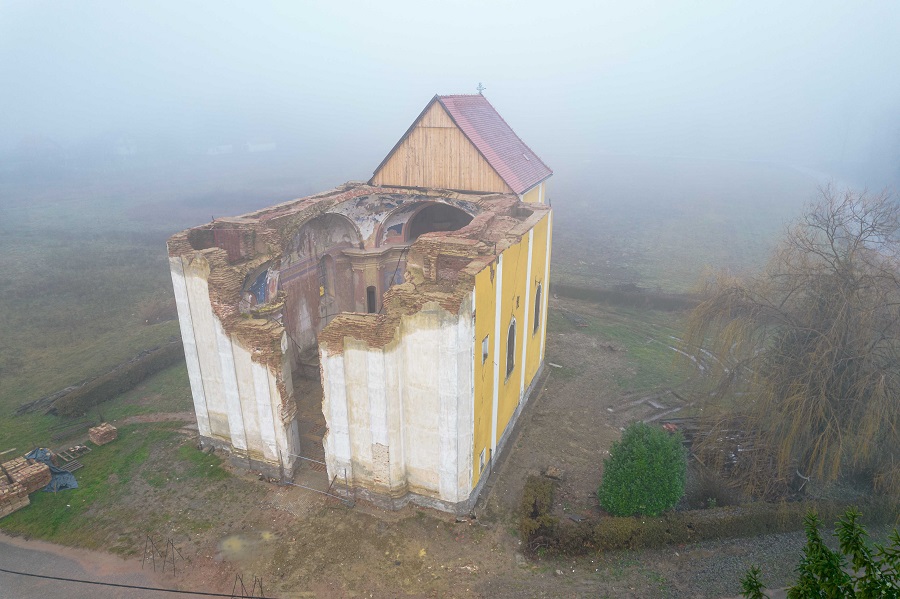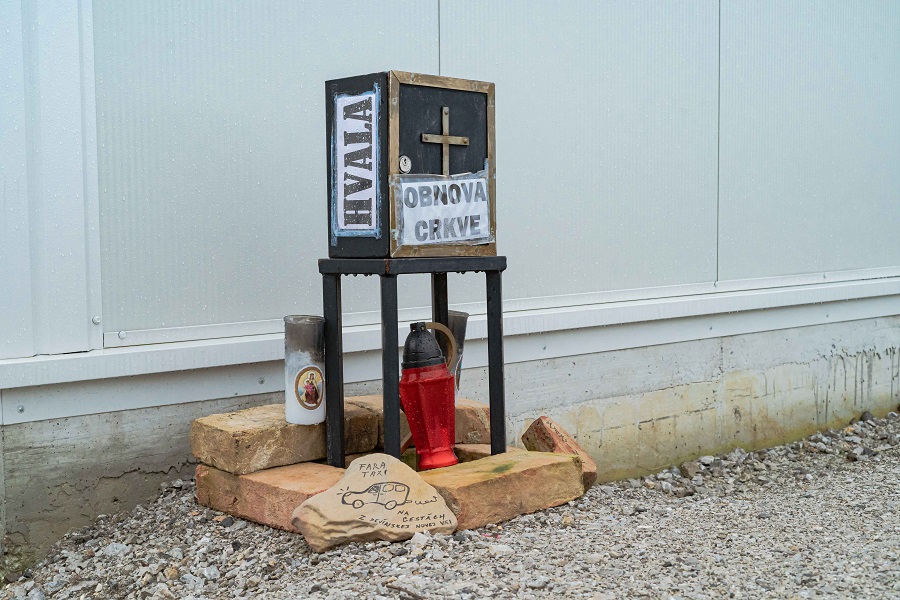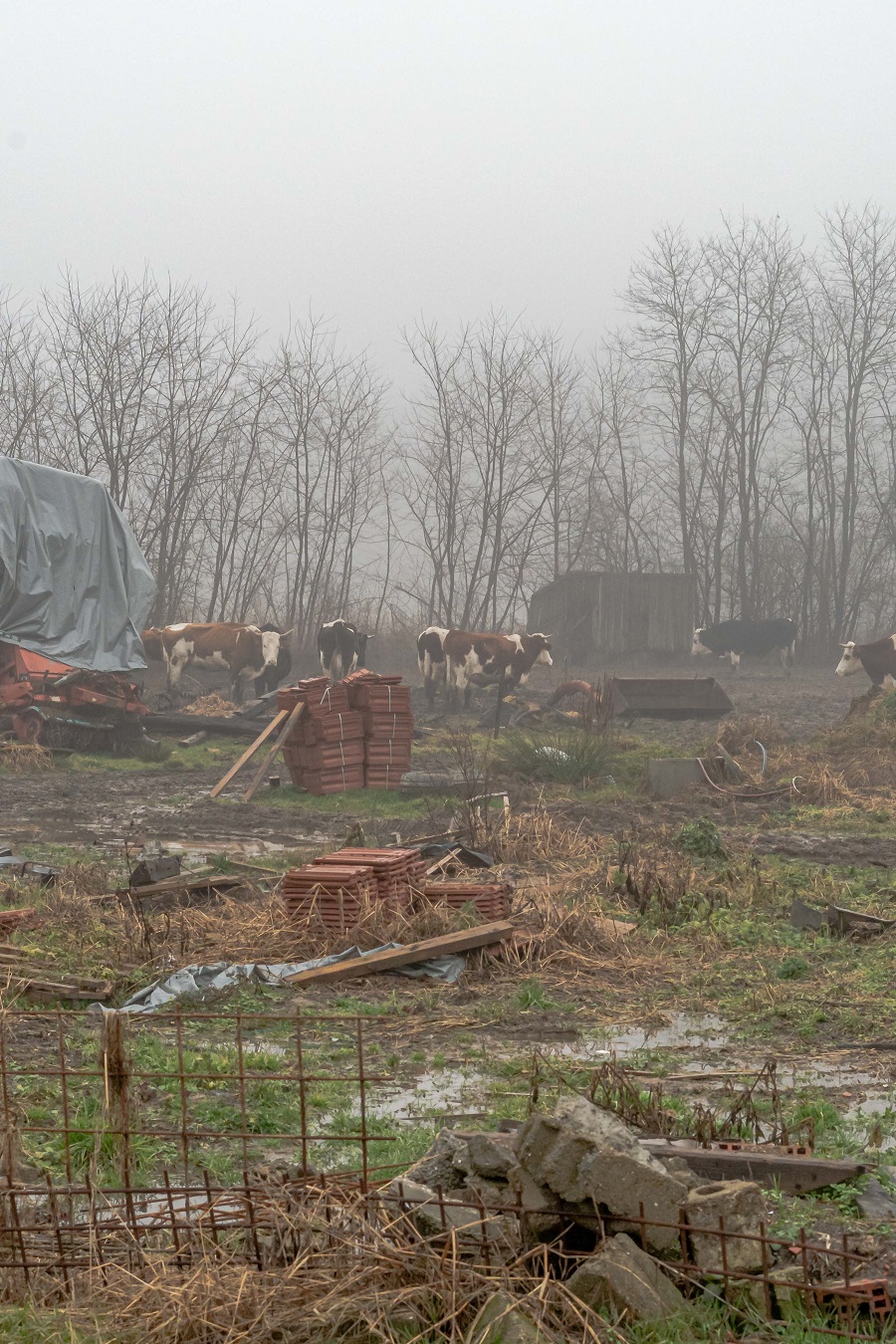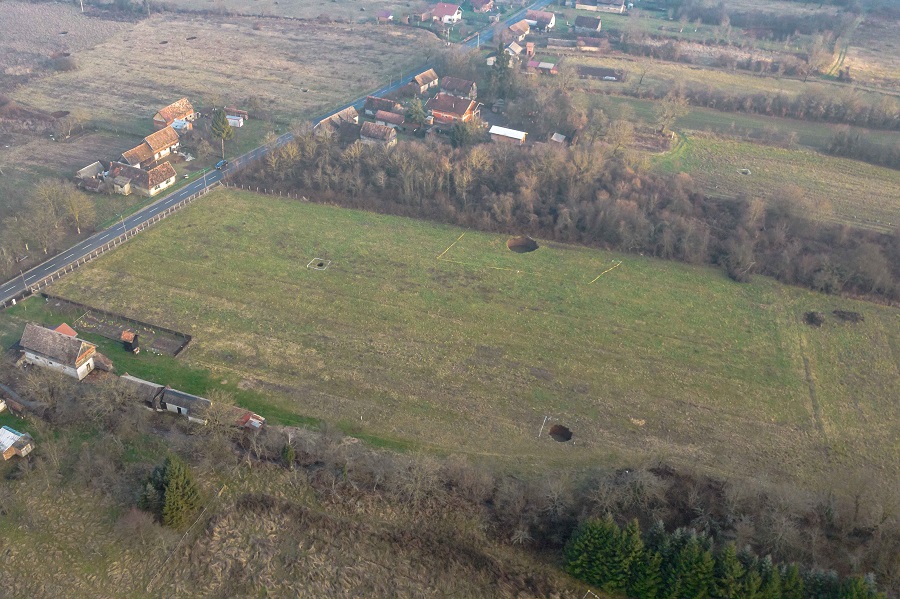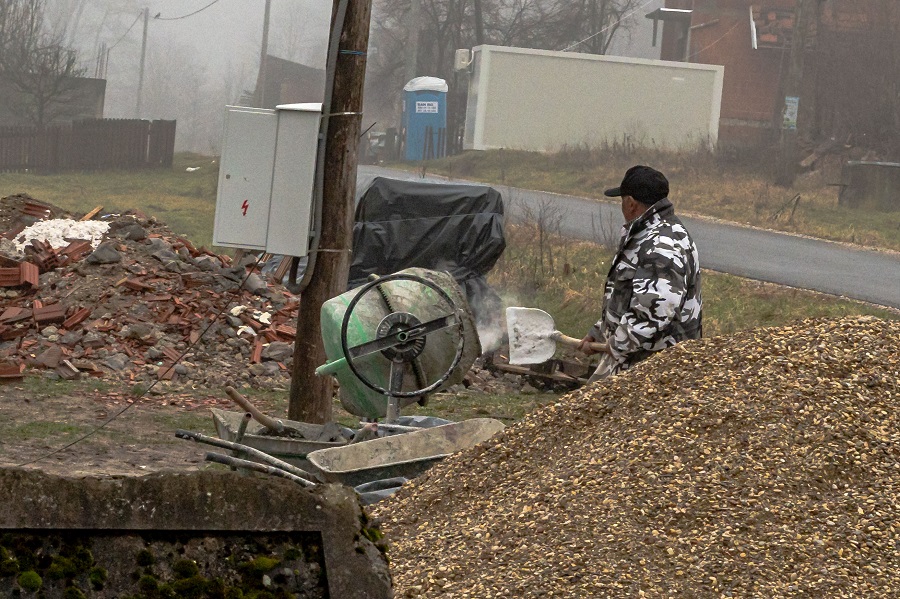Croatia Postpones Buyback Proposal for INA, Launches Review of UNCITRAL Decision
ZAGREB, 30 Dec 2021 - The government decided on Thursday to suspend the buyback of INA from MOL due to new legal circumstances stemming from the Supreme Court's final ruling against former PM Ivo Sanader, who was found guilty of receiving bribes from MOL executive Zsolt Hernadi.
Sanader was given six years and Hernadi, who is beyond the reach of Croatia's authorities, was given two years in this graft case.
The Andrej Plenković government also decided to launch a review of the 2016 ruling of the United Nations Commission on International Trade Law (UNCITRAL) under which Croatia lost an arbitration case it brought against MOL before that court based in Geneva.
The government authorized the Economy Ministry to request the Federal Supreme Court of Switzerland to review the UNCITRAL decision so as to declare an amended contract on the relationship between the shareholders in INA and a contract on the gas business, both signed in 2009, null and void.
The ministry is also authorized to continue activities concerning Croatia's participation in the arbitration process which the Hungarian oil and gas company MOL initiated in 2013 before the International Centre for Settlement of Investment Disputes (ICSID), an arbitration institution in Washington.
In February 2017, Croatia filed a lawsuit with the Swiss Federal Court requesting the annulment of the arbitration ruling in the case Croatia v. MOL that was conducted in line with UNCITRAL arbitration rules. However, the Swiss court rejected Croatia's request in October that year.
In late December 2016, UNCITRAL overruled Croatia's request to nullify amendments to a 2009 contract on management rights in the oil and gas company INA and a gas business master agreement, finding that evidence was not sufficient to prove that the amendments were the result of corruption activities.
This prompted Prime Minister Andrej Plenković to state on 24 December 2016 that his government had decided to regain ownership of INA by buying the entire stake held by MOL.
In August 2019 the government chose the Anglo-French investment bank Lazard as a consultant for its plans for the buyback. Lazard presented a preliminary report on due diligence in June 2020 and a final report in September 2020, giving an estimate of INA's value.
MOL is the single largest shareholder in INA, holding 49.1% of the stock (4,908,207 shares), while the Croatian government holds 4,483,552 shares or 44.8%. Private and institutional shareholders hold 608,241 shares or 6.1%.
For more on politics, follow TCN's dedicated page.
Solidarna Foundation Raises €2.3m for Quake Victims in Sisak-Moslavina County
ZAGREB, 30 Dec 2021 - The Solidarna foundation for human rights and solidarity said on Thursday that its Fund 5.5. had raised over HRK 17 million (€2.3m) to help 1,200 families in Sisak-Moslavina County worst affected by last year's earthquake.
Over 1,000 families have been granted financial aid and some have been provided with accommodation and assistance in repairing their damaged homes and properties. The Fund 5.5 has invested an additional million kuna in the development of local communities in the earthquake- and poverty-affected area, the foundation said in a press release.
The HRK 17 million was raised from 27,614 individuals and 637 companies from all over the world.
Karla Pudar, a coordinator at the Fund 5.5, said that this foundation, working with several humanitarian associations, has launched projects for the construction of wooden houses and earthquake-resistant prefab houses as well as the reconstruction of facilities for the livestock.
The foundation also helped 133 families to rebuild their homes.
An additional HRK 10 million has been given to local development projects involving local winemakers, honey producers, family-run farms, and associations of disabled persons.
(€1 = HRK 7.5)
For more on politics, follow TCN's dedicated page.
Croatian Government Pauses Buyback of MOL's Stake in INA
ZAGREB, 30 Dec 2021 - The government is pausing the buyback of the Hungarian energy group MOL's stake in the INA oil and gas company because of new legal circumstances arising from a Supreme Court verdict and is launching a review of the shareholders' agreement and the gas business agreement, Prime Minister Andrej Plenković said on Thursday.
Speaking at the start of the cabinet meeting, Plenković said that proceedings against the first amendment to the INA shareholders' agreement and the gas business agreement were being launched because the government believes that in light of the Supreme Court's final judgment the agreements cannot be sustained.
In late October, the Supreme Court upheld the trial court verdict sentencing former Prime Minister Ivo Sanader to six years in prison for taking a bribe from MOL CEO Zsolt Hernadi. Hernadi, who remains beyond the reach of the Croatian authorities, was given two years in prison.
Plenković said that the government's decision was based on legal opinions, adding that the government had consulted the State Attorney's Office, the International Law Department at the University of Zagreb's Faculty of Law, and the government's legal representatives in proceedings with MOL.
"In these changed circumstances, we consider it opportune to pause the process of the possible buyback of shares which MOL holds in INA until this new legal circumstance has been resolved," the prime minister said.
The Croatian government and MOL signed the first amendments to the INA shareholders' agreement and the gas business agreement on 30 January 2009.
Under the amendments, the number of Supervisory Board members was increased from seven to nine, with five seats allocated to MOL, three to the government, and one to the employees. The Supervisory Board chair is designated by the government.
The Management Board has six members, of whom three represent the government and three MOL, while MOL nominates the Management Board chair, who has a casting vote.
The master gas business agreement provided for the sale of the Okoli gas storage facility and the gas trading company to the government. In December 2009, the government and MOL signed the first annex to the gas business agreement under which the government's obligation to buy the gas business was delayed until 1 December 2010.
For more on politics, follow TCN's dedicated page.
Croatia in 2022: 10 Things to Look Forward Next Year
December 30, 2021 - The pandemic continued to hamper many, many sectors of the country in 2021, but there were also reasons to believe that next year will help us move past the troubles with ease. An overview of the reasons to look forward to Croatia in 2022.
2022 is just around the corner, and for the vast majority, uncertainty continues to prevail over the rest of the sensations for the new year. However, while the pandemic continues to pose a threat to the country's public health and economy, there is an air of optimism for the coming year. The premise that I hear most often is that 2022 will definitely be better than 2020 and 2021. And yes, well, there are reasons to believe in it. These are some of the ones that I think invite us to believe.
COVID-free travel (?)
We will begin the count with a reason that is still ambiguous in many ways. While travel restrictions in Europe are currently more flexible than last year or 2020, the Omicron variant and low vaccination rates in many European Union countries continue to create uncertainty regarding the next steps to take.
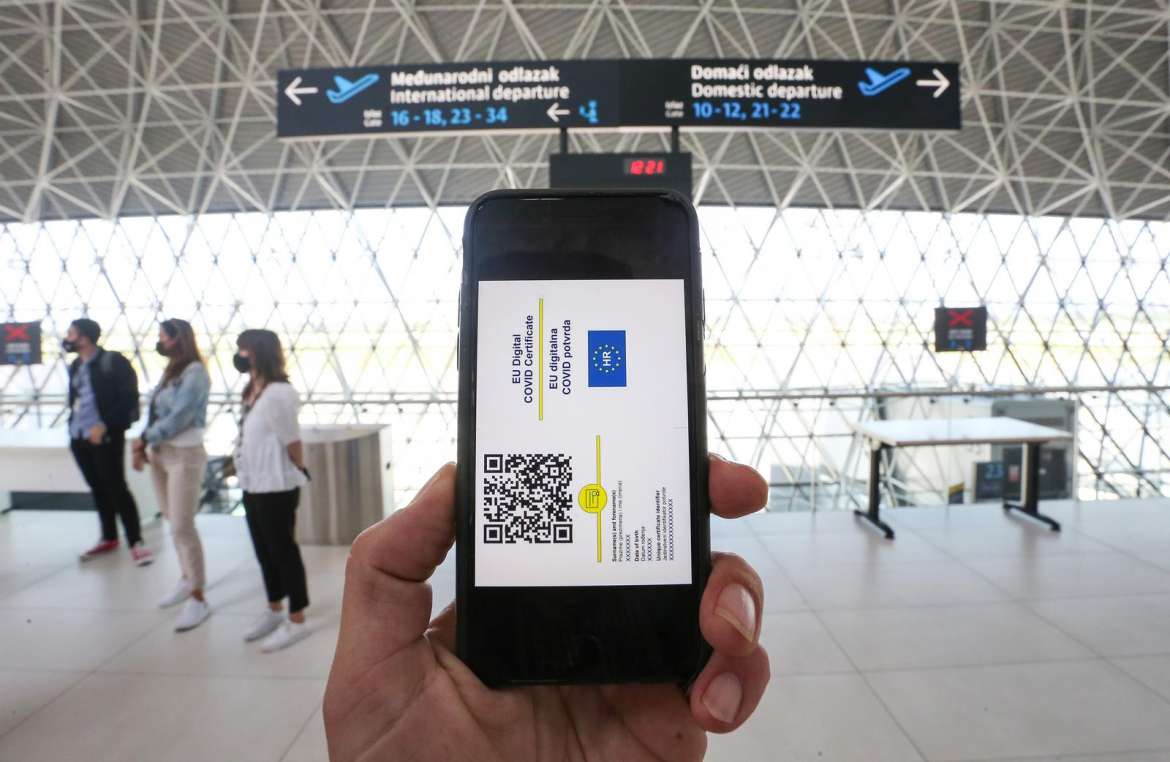
Photo: Zeljko Lukunic/PIXSELL
Despite the fact that COVID-19 continues to affect travel restrictions, the trend in the last two years appears to be positive. In 2020 tourism was affected almost insurmountably. Borders were closed, flights were limited, cruises quarantined, very few tourists arrived, restaurants closed, and more. However, in 2021 and with the arrival of the vaccine, the situation improved considerably and little by little the restrictions were relaxed. The EU COVID digital certificate and the ECDC map helped establish appropriate parameters for the arrival and departure of foreigners to the territory of each country, depending on the situation of COVID cases in the countries of origin. The numbers were still far from those of the last year without a pandemic, 2019, and that is why the season arrived a bit late at the end of June. However, the months that followed saw a massive influx of tourists and flights from all over the world. Even in October a lot of tourist movement could be observed.
If the percentage of the vaccinated population increases in Croatia and epidemiological measures continue to be promoted to guarantee the country as a safe destination, it is very likely that the number and variety of flights will start to increase, and the season could be expected to start early as in May.
Pelješac Bridge
What was longed for for so many years, this year finally came true. The last segment of the Pelješac Bridge was completed, and the reconnection between Croatia and Dubrovnik was celebrated in a symbolic act. The bridge, whose construction began in mid-2018, cost more than 400 million euros and has a total length of 2,404 meters and a height of 98 meters.
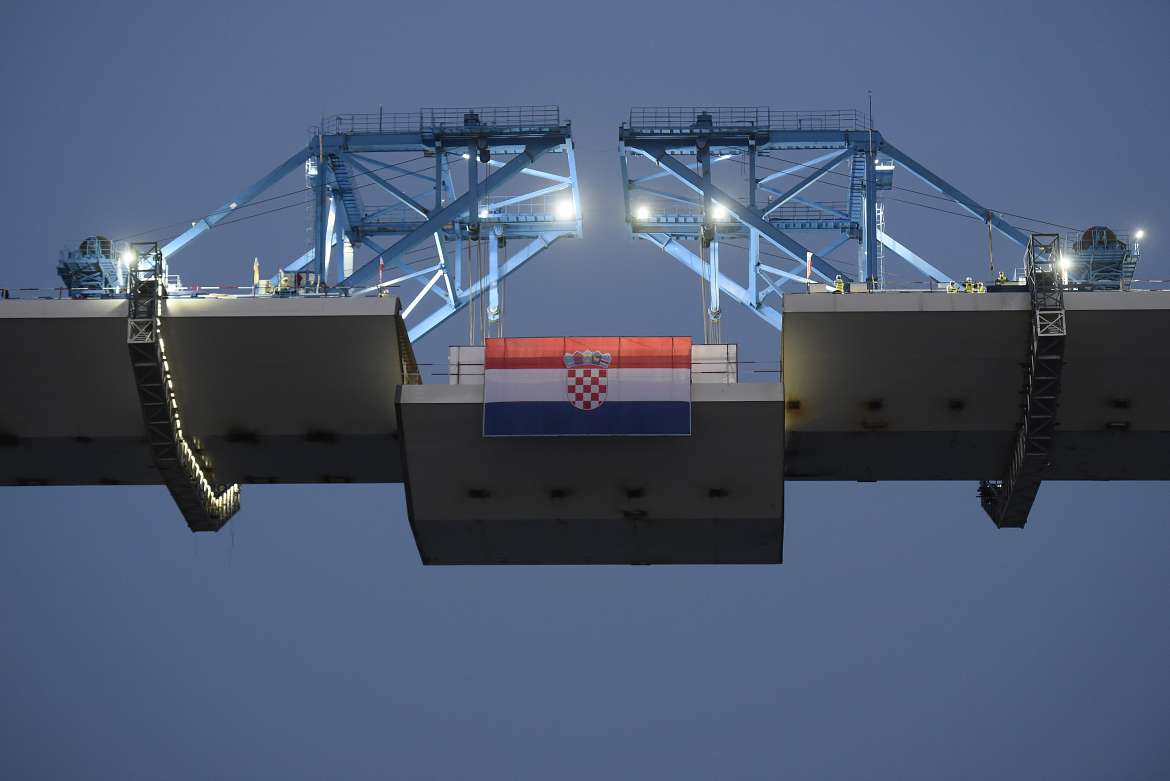
Photo: Mario Strmotić/HINA
The bridge will start at Komarna, 26 km south of Ploče, crossing the Neretva canal and Mali Ston bay, to reach the Pelješac peninsula and continue all the way down to Dubrovnik. In this way, the Pearl of the Adriatic will be 100% accessible through Croatian territory, and that is how the Neum corridor in Bosnia will no longer be the only way to reach the Croatian city.
The bridge is expected to open in June 2022, and will definitely revolutionize tourism on the southern coast of Croatia.
Concerts and Festivals
The music events sector was, without a doubt, one of the hardest hit by the pandemic. Many businesses sought to adapt to epidemiological conditions, but the concerts were simply impossible to carry out due to the impossibility of guaranteeing social distancing due to the crowding of spectators.
However, 2022 promises the return of festivals that had to be canceled due to the coronavirus, such as Ultra in Split, or INmusic in Zagreb. Also, great concerts have already been confirmed for next year, such as Future Islands (March 3rd at Tvornica, Zagreb), Iron Maiden (May 22nd at Arena Zagreb), or The Cure (October 27th at Arena Zagreb).
FIFA World Cup in Qatar
The Croatian national team closed 2021 in a good way, securing their ticket to the next World Cup, achieving direct qualification by beating Russia 1-0 in Poljud. In this way, the Vatreni avoided the European play-offs and, therefore, unnecessary anguish as in past editions.
Despite not being able to repeat what they achieved in the 2018 World Cup at EURO 2020, Dalić's team found in the second half of this year an opportunity to evolve, combining the player base that achieved second place in Russia, such as Modrić, Lovren, Vida, Perišić, Brozović, Kramarić or Kovačić, with others who made good use of their opportunities, such as Sosa, Livaja, Gvardiol, Juranović, Vlašić, and Pašalić.
Whilst it is still unknown who Croatia will face in the group stage, there is every reason to believe that they will be able to play a good role in Qatar. The World Cup will be held in November-December, which could generate more energy in the post-season, especially in coastal cities.
Schengen area
Next year is an important one, as a decision is expected regarding Croatia's access to the Schengen area, which would allow the abolition of all passports and all types of border control, improving accessibility to and from Croatia from the other 26 member states, as well as many other foreign countries.
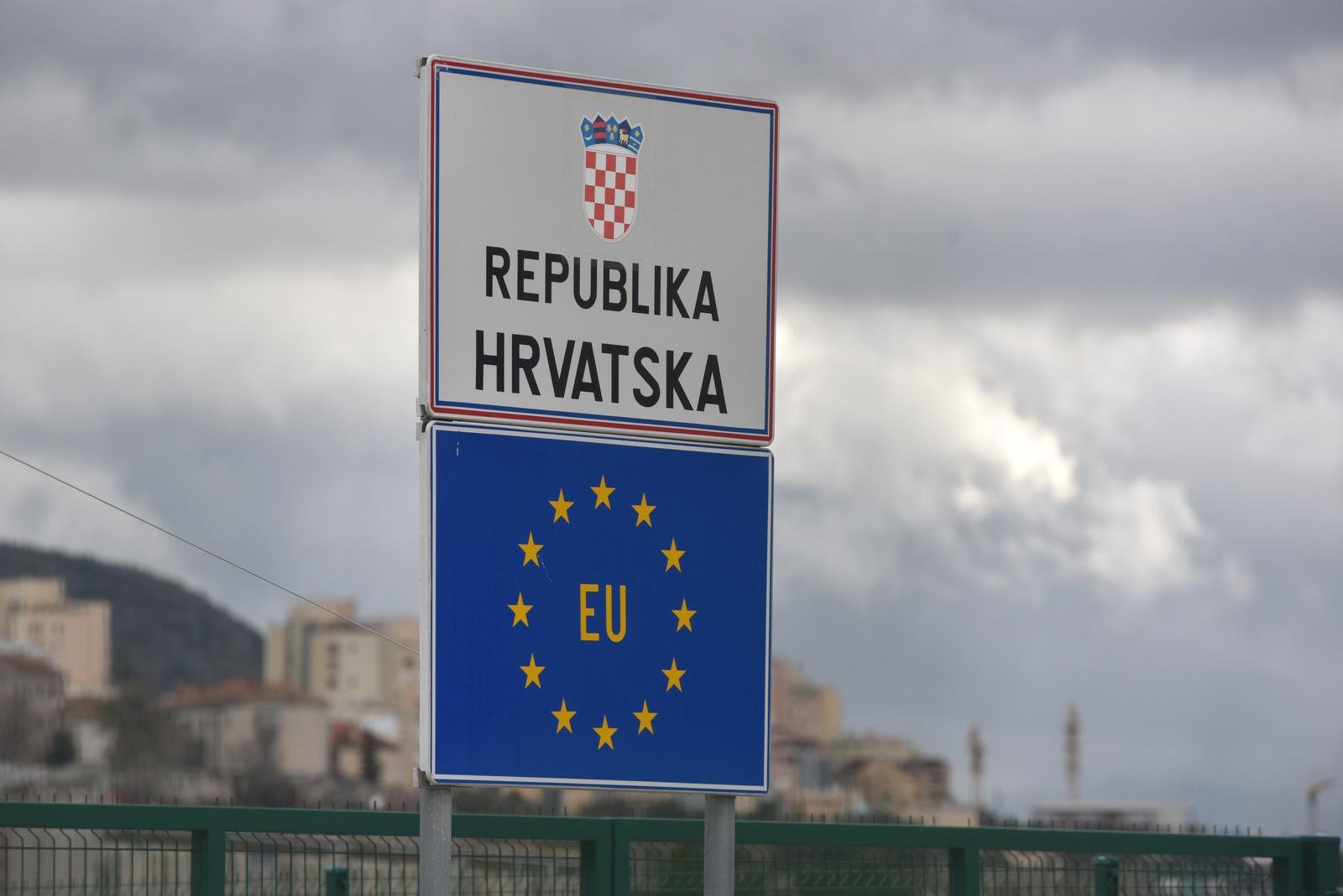
Photo: Hrvoje Jelavic/PIXSELL
In 2021, Croatia received visits from the President of the European Commission, Ursula Von der Leyen, who gave the go-ahead to the National Recovery and Resilience Plan (NPOO) presented by the First Croatian Minister Andrej Plenković for the period 2021-2026; as well as the President of France, Emmanuel Macron and the Prime Minister of Spain, Pedro Sánchez, who, like Von der Leyen, expressed their support for Croatia's accession to the Schengen area.
Eurozone
The Euro will become the official currency of Croatia from 2023. According to the Croatian National Bank, in the first quarter of 2023, the kuna will begin to be collected and the Euro circulated instead. 2022 will therefore be a decisive year for the Ministry of Finance, as well as all attached entities, to organize a subtle and appropriate transition and to avoid economic repercussions.
The Governor of the Croatian National Bank, Boris Vujčić, announced that starting next summer, prices in stores should already be displayed in both kuna and euros. Croatian Finance Minister Zdravko Marić announced from his side that they will closely monitor the process to ensure that prices are fair and control the inflation rate. A law introducing the Euro is expected to be presented in April 2022.
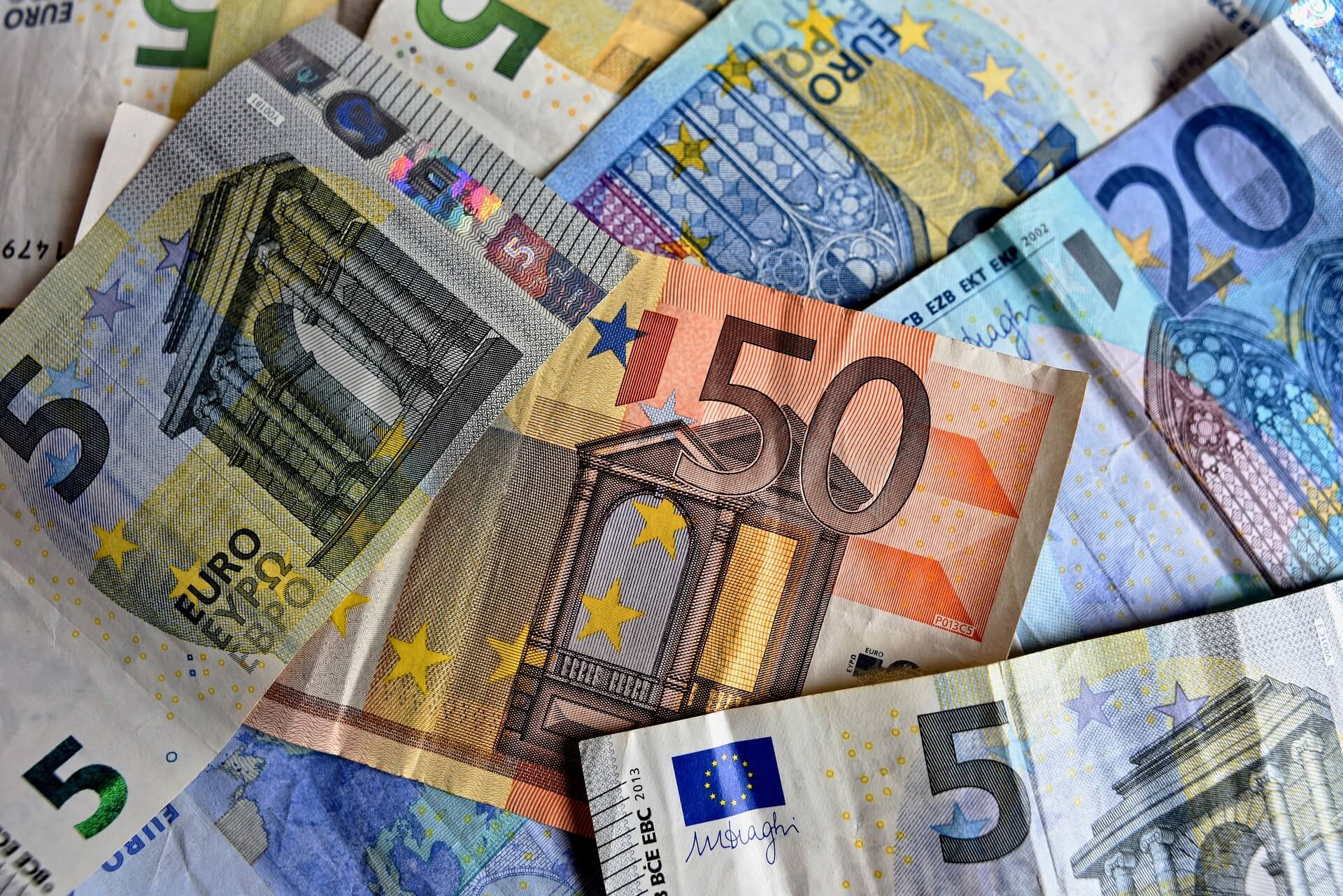
Photo: Pixabay
Again, it is important that in 2022 the Government constantly and transparently report the benefits and positive aspects of the Euro, in order to achieve general support from the population. It should be taken into account that a national collection of signatures was recently carried out to postpone access to the Euro.
US visa-free travel
In the last quarter of 2021, Croatia's access to the United States Visa Waiver Program was made official, which meant that, as of December 1, Croatian citizens can travel to the American country without the need for a Visa.
The measure comes at a time when the travel situation between Croatia and the United States has improved considerably, taking into account the success of United Airlines' New York-Dubrovnik flights in the summer of this year, which have been extended until October. of the next year.
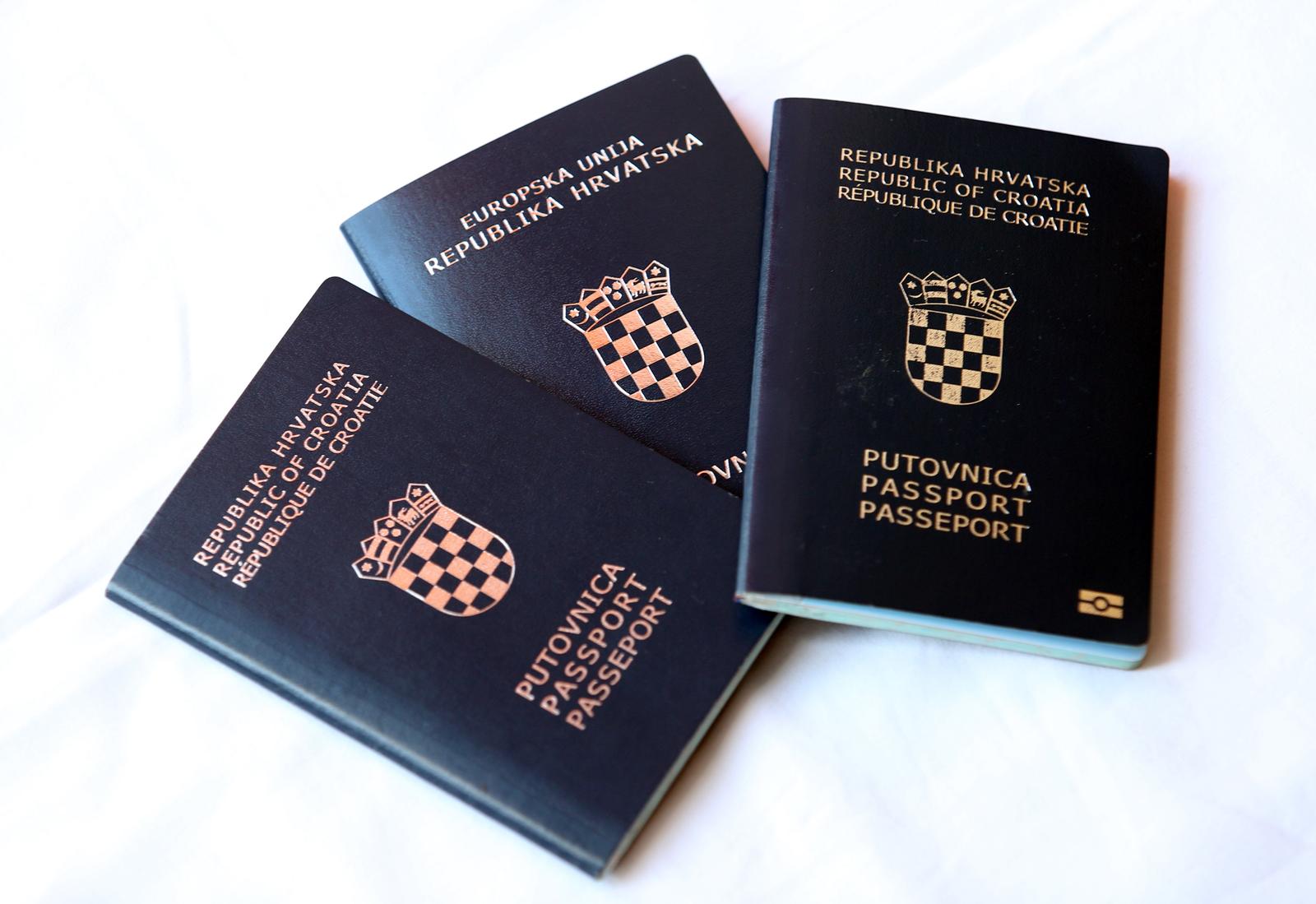
Photo: Dusko Jaramaz/PIXSELL
It is very likely that, considering the evolution of the epidemiological situation, we can see in 2022 a large migratory movement between the two countries.
Winter tourism in Split
I have spent two winters in Split since arriving in Croatia in 2019, and I still don't understand how the city and the county can completely shut down once the season is over. The number of opportunities to successfully show Split as a winter destination invites us to take a step forward, despite the frustrated attempts of the past.
So this year, four women from Split laid the foundations for a meeting that could be decisive for the future of winter tourism in Split: Daniela Rogulj from Total Croatia News, Jasmina Garbin from Chops Grill, Maria Mustapic from Zinfandel, and Jelena Tabak, President of the National Association of Caterers.
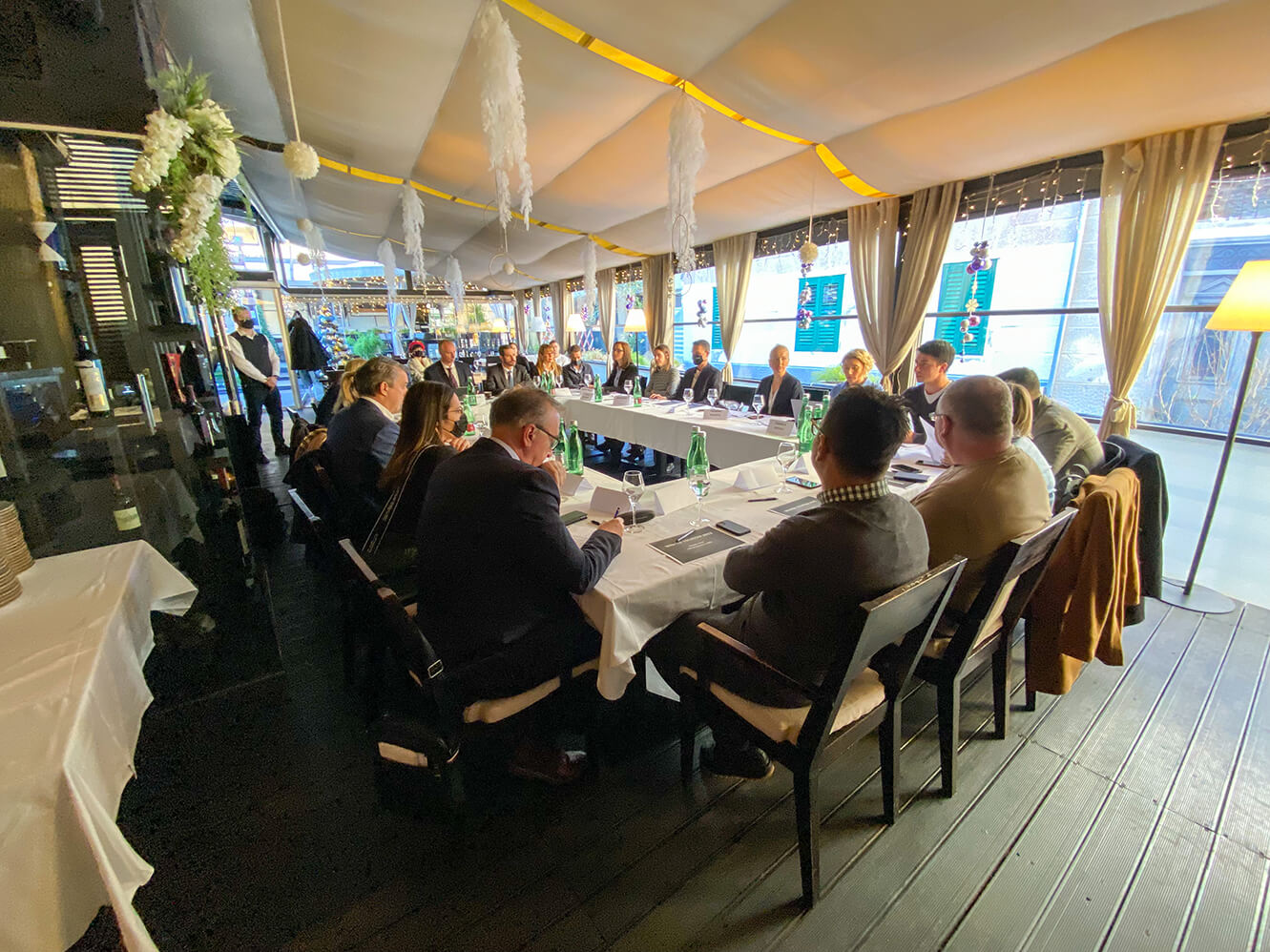
Photo: Jose Alfonso Cussianovich
A series of meetings and research led to the realization of a round table that brought together Ivica Puljak, Mayor of Split, Tonči Glavina, State Secretary of the Ministry of Tourism, Alijana Vukšić, Director of Split Tourist Board, Joško Stella, Director of Split -Dalmatia County Tourist Board, Pero Bilas, Deputy Director of Split Airport, Joze Tomaš, President Split-Dalmatia County Chamber of Economy, and different representatives from the hospitality and catering sectors.
The meeting left very good impressions, and after all concerns were expressed openly, a very positive atmosphere was created where solutions and proposals for collaboration between the public and private sectors were exchanged. Now, it is a matter of words being translated into action, and that the city of Split, Split-Dalmatia County, and the restaurants and hotels of Split work together next year to extend the season until November.
Diaspora
The return of the diaspora to Croatia has been happening since the country became independent in 1995. However, in recent years, the number of migrants of Croatian descent who decided to return to their motherland has increased significantly.
In South America, one of the continents with the highest number of Croatian diaspora, many factors have interceded to motivate many of them to try their luck in Croatia: insecurity on the streets, political and economic instability, and the precarious health system, especially in the wake of the pandemic. Through state-organized incentives and programs, such as the Croatian Language Scholarship, many come to the cities of Zagreb, Split, Rijeka, and Osijek to discover more about their roots, regularize their citizenship, and adapt to Croatian society and culture.
The arrival of the diaspora means a positive contribution to the social and economic development of the country, considering that Croatia also faces a complicated reality in which a large part of its youth decides, year after year, to seek better salary and work opportunities in other countries like Germany, Ireland, or the United States.
Digital Nomads
This year marked a before and after for the Digital Nomads community in Croatia. At the beginning of 2021, the Digital Nomads Permit was presented, granting the possibility that those interested can reside and work in the country for one year. While it is true that a higher number of arrivals was expected, it is important to take into account the existing travel restrictions and the epidemiological situation.
The events and initiatives carried out throughout this year and in almost all parts of the country show the growth of a community and a global interest that has no ceiling: Digital Nomads in Residence in Dubrovnik, the Zagreb Digital Nomad Week, the Ambassadors project Digital Nomads of Zagreb, the Valley of Digital Nomads in Zadar, etc.
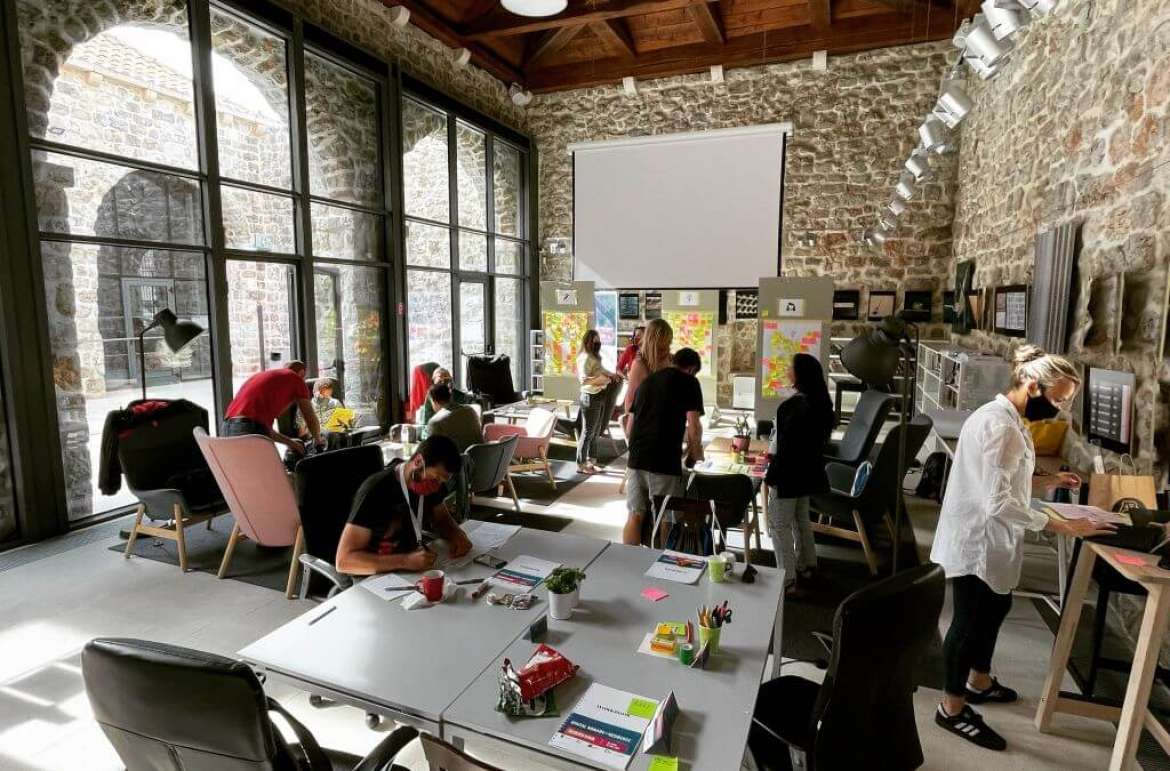
Likewise, the testimonies and experiences of dozens of Digital Nomads in different regions of the country, as well as the interest expressed by many of them to access the permit starting next year, generate a lot of hope. More events are expected to take place, more coworking venues built, and more initiatives such as CROMADS, which seeks to present Croatia as a country rich in activities throughout the year, will continue to attract more Digital Nomads in 2022.
To get the best start to the year, be sure to follow Total Croatia News on Instagram, Facebook, LinkedIn, and Twitter. For more information about Croatia, its destinations, and everything you need to know before traveling, visit Total Croatia. If you want to know everything that Croatia has to offer you twelve months of the year, visit our new portal, CROMADS. For more news about Croatia, click here.
Total Croatia News wishes all of our readers and subscribers a Happy New Year!
300 New, 300 Old Tourist Board Directors in Croatia from January 1, 2022
December 30, 2021 - According to the latest information from the Ministry of Tourism and Sports, 300 tourist board directors in Croatia will be replaced immediately after the New Year.
Namely, on January 1, 2022, the provision of the article of the new Law on Tourist Boards and the Promotion of Croatian Tourism, which was adopted in 2020, enters into force, reports Index.hr.
As Index.hr learns, the current tourist board directors will not be fired; they do not lose their jobs, but they will have to find a new job within the tourist board if they have an indefinite contract.
In addition to the tourist board directors, a new director of the Croatian Tourist Board (CNTB) will be selected.
According to the new provision, directors are elected for four years, which has not been the case so far. Namely, their term lasted indefinitely, that is, until the tourist board confirmed the report at the end of the year.
The Ministry of Tourism and Sports told Index that on January 1, 2022, the provision of Article 22, paragraph 2 of the Tourist Board Act came into force. This provision met the legal requirements for announcing tenders to elect tourist board directors.
"The election of tourist board directors terminates the office of the persons who held that office until the election of tourist board directors following Article 75 of the transitional provisions of the Act. However, the termination of the director's mandate does not mean the termination of the employment contract by force of law," Index learned about whether the current directors will be fired.
The provisions of the Labor Act and directors who have established an employment relationship for an indefinite period retain the rights from the employment relationship provided for in the employment contract.
"The employer is responsible for the correct application of the Labor Law, in this case, the tourist boards. Therefore, there is no unambiguous answer to the question of canceling or concluding fixed-term employment contracts in other jobs. Still, each employment relationship should be considered concerning the concluded contract," stated the Ministry for Index.
The decision on announcing the competition, and thus the deadlines, i.e., the time in which the directors will be elected, is said to be made by the Tourist Council.
"In the end, the tourist council of each tourist board chooses the best candidate and makes a decision," they added.
When asked why this law was changed, according to which directors are now elected for four years, they answered that before the pandemic in 2019, they started reforming the legal framework aimed at sustainability and professionalization of the tourist board system, where the directors will have a term of four years.
"This ensures competitiveness and the ability to respond more quickly to the challenges facing destination management, which became especially evident last year. In addition, the sustainable development of tourism that we want requires specific knowledge, which includes the environmental aspect and response to climate change, digitalization, and perhaps most important of all, social sustainability and a better life for the local population," the Ministry said.
The current Tourist Board directors oppose this provision.
Index thus received an e-mail with a letter by lawyer Boris Ivančić, who the Split-Dalmatia County Tourist Board hired.
In a letter sent to all directors of Split-Dalmatia County tourist boards, lawyer Ivančić wrote about the problem with the new law.
"Namely, although there is no obstacle to the appointment of a new director of each tourist board, we are convinced that they, although they can be elected under this regulation, cannot take over the duties they should perform by law, all because the Ministry did not regulate the issue of termination of office of previous directors (appointed, following the law, indefinitely), as a result of which each tourist board, which would decide to elect a new director through a tender, is threatened with significant property, but also functional damage," reads the letter.
The lawyer further states that for this purpose, he explicitly suggests stopping all procedures for electing directors following the provisions of the new Law until the issue of dismissal of current directors is defined with the Ministry.
For more, check out our business section.
In Praise of Croatian Public Health: My Triple Bypass Success Story
December the 30th, 2021 - The Croatian public health system is faced with a lot of criticism, much of it is unfounded, here's my story.
Last spring was promising me yet another wonderful, very long, carefree and rejuvenating time down by the sea. Retirement is a blessing. It offers freedom of movement (plus freedom of speech if you enjoy it properly) and, especially, total command over one’s time. That's the bright side of it.
Time is man’s only true possession - everything else is precarious, ephemeral, temporary or illusional, much like our own bodies and physical states, for example. They're precarious, ephemeral, temporary, limited, and certainly not a supporting companion to our soul. I think that babies start crying seconds after their birth not because they are terrified by the new environment, but because they experience physical pain. Pain is man’s first experience of the world. Our body is not our friend, and it is less and less so as time goes by.
Health of course is tied to what one does on a daily basis to try to preserve it. Some attempts are futile, most aren't. Some people understand that early on, most don't.
I'm proud to say that my life allowed me to sin for a major part. A lot. Heaps more than most people I guess. I have seen more dawns than twilights, so to speak. Because life in general was generous to me (well, even during the war it was rewarding in many ways when I think of it), serenity prevailed by far over all of my days. When you're young, you are supposed to be all kinds of things when you grow up and you can of course do anything, including becoming an ''adult'' while still underage, because you need to keep up with the boys from your quarter, all of whom are your seniors by quite some years.
You cannot afford to be called a sissy if you didn't smoke, which you would be. At least back then. So I started smoking when I had barely reached the ''ripe old age'' of 16, when of course I knew everything there was to know about life, as did you, I'm sure. Later on, in the long years of studying and then freelancing around the world, partying and booze came into the picture, too, inevitably. Not that I'd get wasted every night, of course, but, well, there was lots of partying and many dawns, and many an estranged taxi taking me to where my bed was while missing my sunglasses and a bottle of water most desperately.
I remember discovering ''The Memories of Hadrian'' somewhere in my early twenties and re-reading that book several times over. Among quite a few memorable points, despite myself being young and utterly healthy, my mind recorded that moment when Hadrian started to become tired of his body which was becoming a nuisance, a traitor, limiting and disabling him. Almost one half of a century later, Hadrian has come to my mind so many, many a time. What a piece of work is man, Master Shakespeare wondered. Indeed.
When you think how you hated your granny (and your mother, and aunt and practically every adult around) who scorned you for not wearing a sweater, not having your shirt tucked in properly, sitting on cold concrete that would certainly make your kidneys ''go bad'', for going out (on a date possibly) with your hair still wet from the shower as a safe way of getting meningitis and inflamed sinuses, not to talk about lessons on how bad smoking is for you and how alcohol damages your liver… But who would listen? All of those irritating pontifications might have been true, but they had nothing to do with you whatsoever in your mind.
And then, how many times have you heard that somebody died of ''a sudden heart attack''? Sudden!? It took almost all my life so far for me to learn that there is no such thing as a sudden heart attack. Such events, rare as they are, are freak ones. Every stroke or heart attack has its silent and deadly history built up in the years, it has its progress and, especially its cause(s) that live with you for a long time before that. You pay no attention, and then you're suddenly being transported to an emergency ward. Genetics play a role of course, but the cause is - you. Or, in my case - me. Also because my granny got on my nerves so much.
The experience I had was more than terrible, and I want to share some of it.
I was in London some eight years ago when the very first rays of warning shone up inside my brain. One day I was walking from an underground station to the house of my friends where I stayed. It was an everyday routine, nothing special, and quite a short distance too. I might have been less than 100 metres from the house when I felt my right calf suddenly become stiff, further steps were oddly difficult, I started limping and hardly made it to the gate. The remaining several days were highly marked by that. I had pains when walking, I could not walk for long, either. It was sudden. It was frightening. That is when I was reminded of the not-so-good genetics pertaining to arteries in my family. There I was. It has caught up with me despite my lack of attention. I should have listened.
Back in Zagreb I hardly made it upstairs, dragging a suitcase along with me to my apartment at the same time. All alarms then began ringing inside me. This was no pulled muscle, and no self-resolving, passing ailment. One or two calls to my friends sent me to a hospital right away. There was a clog in my artery that had stopped the flow of blood to my leg almost completely and the operation, performed under local anaesthesia, was carried out by a young doctor who I made laugh heartily while he dealt with the clog.
When you must not move an eyelash for almost two hours, it feels much longer than it is. I was alone in a spacious room, I had a TV, my own internet and actually had a good time within the circumstances, however ''disturbed'' by frequent check-ups and controls by medics. The care was total and complete and made me feel safe and comfortable. It was proof that the Croatian public health system, while underfunded, was beyond excellent.
This happened somewhere exactly around Easter Day and I was glad I could avoid traditional lunches and coloured eggs. That’s for kids, I find. Five days later I was back in the normal world with a clean artery and feeling quite good, quite normal again. I avoided driving and public transportation and walked everywhere I could. That is how you control cardiovascular diseases which only require conservative treatment. I soon forgot about that.
Pain gone and experience fading, I soon regained my old lifestyle. A thousand parties and no work, as Gertrude Stein defined the Thirties in Paris. Well, almost. Freelancing allows for that, as anyone who has dabbled in that knows well.
As a heavily addicted smoker, I wasn't aware of what I was silently but lethally doing to myself. Friends and family would warn and rebuke me, some strongly. I continued believing that the slogans on tobacco packages about death, cancer and other pretty things could not possibly affect me. Larger than life I was. Isn't cognitive dissonance a strange thing?
I could not bring to my awareness that getting out from a warm restaurant into freezing rain just to have a smoke made my granny turn in her grave while my arteries were getting more and more clogged by the day, by every single puff on a cigarette, by every single drag. My life was so good again, so why should I listen?
Some years went by, the uneasy feeling in my legs was growing once again, slowly but constantly, until I reached the stage when I could barely make a distance of 50 metres and was in almost constant discomfort. My calf writhing with each step as my body desperately tried to transport adequate oxygenated blood. In vain.
It was a wonderful evening with a gang of friends of an international composition, with so much fun, laughter, totally uninhibited by ''Weltschmerz'' and the futility of life. When we had to change the place because of a rapidly approaching closing time, I realised I would hardly make it on foot. The other place was less than 200 metres away. The final alarm was on. Again.
One call to a doctor friend put me in hospital almost the same day. During the first check-ups it seemed it was to be an easy intervention, then they took some blood, did some tests and found out that my blood sugar was above 20. It was too dangerous to operate. I was diabetic too, apparently. I had no idea what my body was suffering from, how could I have been so detached? How dare I feel surprised by my neglect? It was almost one week before they managed to bring it down to an operable stage.
I had peripheral arterial disease. An incurable but controllable arterial disease which affects the limbs, mainly the legs. My femoral artery was entirely clogged, and so were some others. Well, there we go. Another operation, a big one this time, with general anaesthetic and consent forms galore. I woke up after some hours, the doctors couldn't believe how brilliant my readings suddenly were, how my body which obviously was in dire need bounced straight back after being given what it needed. Instead of a longer sojourn in intensive care, I was taken quite quickly back to my room to recover. Yet again, more very good care at the hospital, another operation gone well, expertly well. It made me think of all those accolades Croatian medicine has been getting from all over the world. It is very deserved. Take it from me.
A few more years passed by. My left leg still had a few problems, some due to nerve damage following surgery, but it was truly nothing in comparison to how I felt before that last operation. I got used to stopping when I walked, waiting for a minute or two when I experienced claudication, and continuing. Naturally, I didn't feel enthusiastic about walking at all. My legs felt heavy and not willing to be exposed to any strain. Because of the pain it caused, although that pain was actually my saviour which would help to treat my disease, I started avoiding going anywhere on foot.
Unlike that first time, the famous blue Zagreb trams became my favourite way of moving around the city, and driving too. Then, my doctor scolded me, telling me that I must walk, walk and walk some more. By walking and straining the legs, you help your body develop more collateral blood paths, you help your heart, you help your - everything. I did reduce my nicotine intake, with lots of effort and self-control, but I could not abandon it altogether. By the way, for all you dirty smokers out there - I reduced the number of cigarettes by allowing myself to smoke only on the terrace, outside, never inside the house. It helped. Maybe you could try that, too. It was quite an achievement for me who once smoked 40 per day, but I still couldn't quite kick it to the curb. Idiotic, I know.
My close friend, Lauren, started to force me to walk. We'd take long walks, not just to a cafe. She would get me to do it daily, again and again. I felt better. The splendid Maksimir Park offers infinite combinations and paths to stroll, for as long as you can or want to. I was forced to make at least 6000 - 7000 steps each time. For orientation, I could make some 200 in one go. Imagine the effort! I had to stop many times, but I did it. Never without losing my breath, panting or anything, never feeling that my heart was suffering. But to tell the truth, my physical condition was not exceedingly good. To put it modestly.
Fast-foward to April 2021. The leaves on the trees were turning green, everything was in blossom, Maksimir Park looks truly fabulous at that time of year, permeated with the birds’ twitter and the gentle breeze in the thick tree tops. As nice as all that is, as a Dalmatian from Dubrovnik, I was craving the sea. Addicted to the sea and, especially, to swimming - at least for 6 months a year, usually - I started coining my plan to go to the coast much earlier than usual and to make the ''summer'' a very long one indeed. I decided to have myself checked properly, to be sure I could spend several months in a village, far from my doctor friends in case, God forbid, I needed one.
I contacted my friend, a renowned vascular surgeon from Zagreb, and asked him if he would be willing to check me up ''properly'', with scans and the works, as I really wanted to know what was going on inside me, especially inside my arteries. At one of those check-ups, I ''demanded'' that he check my heart. Without any apparent sign of anything. I just wanted to be sure. It might have been genetic hint from some of my ancestors from ''up there''. I had no cardiac symptoms that I could discern, it just came out of the blue.
How unfortunately right I was! My blood pressure was through the roof. I was suffering from hypertension which is high blood pressure, a common condition in which the long-term force of the blood against your artery walls is high enough that it may eventually cause heart disease. The ultrasound not only found some other little flaws in my heart, but three main arteries were more or less clogged. I needed a triple coronary bypass in an emergency procedure. I was ordered to stay in the hospital that same moment. In other words, I had to be under permanent custody, linked up to various monitors, as my heart could collapse under the strain at any moment. How and why I had not had a massive heart attack during those thousands of steps in Maksimir Park will remain a secret forever. A miracle, in fact, as told to me by my doctor.
An important reminder: there are very, very few sudden heart attacks. They only hit suddenly, when the silently struggling heart can no longer cope.
I did not have a heart attack, as the intervention occurred just before the inevitable happened, and I did not fear one. I told myself I should have that operation as soon as possible in order to be able to - go to the sea. Baby steps.
I spent two weeks in an utterly nice, freshly renovated ward, feeling alright under the constant telemetric control. I became used to the idea that I must remember the cables attached to me round the clock. To me, there were no signs or signals that my heart was penting up to provide enough oxygenated blood to the rest of me. Once again, to praise the Croatian public health system, it is so good when there is a bunch of communicative doctors and, especially, nurses with who you can share a laugh or two.
I loved the sliding doors that saved everybody from being woken up by doors slamming somewhere down the corridor. I ignored the fact that I was confined, in detention, it was for my sake and for my good. I also ignored the fact that the pandemic and the inability to have visitors made this period of isolation more conspicuous, in some cases even very cruel. I had all the care I needed, my doctor friend (from another ward) would visit sometimes bringing with him absolute confidence and peace to my soul.
Tests, scans, readings, as the big day arrived. Taken by an ambulance to the central hospital to be operated on, an efficient nurse accompanied me to my new room and a new roommate, and luckily a very funny one. Sarcasm is one of my favourite assistants. New doctors, kind and caring nurses. Preparations for the operation, some not pleasant at all, but all done with patience and total care. The Croatian public health system succeeded very well in making me feel safe, despite all the huge question marks and worries hovering in the air and above my own head.
The surgery was done. I woke up feeling that I was tied to a bed in an unknown space. It was so dark, just one lamp offered a slip of light somewhere in the distance, at some corner or something, my anaesthetic-induced blurry vision and confusion limited my understanding of my surroundings. My throat felt as if it had been cleaned out by a bit of aged sandpaper. I needed water. I tried to yell, but I produced no sound. I realised I was still intubated. I was helpless. I needed water. There was an attentive nurse on the sentinel who discerned my growling sounds in the dark. It wasn't just water this time, it was the blessing of all the Gods that ever existed to me at that moment. Sleep. More water. Several rounds, a few tests. After some indefinite time, they rolled me back to my room.
The time of colliding with reality, with the seriousness of my body, had come to me. Thank you, Hadrian, you were so right and I hope you were not this sick and unable. I felt like a broken piece of old furniture chucked out into the street from the fifth floor. One slightest move of any part of my body hurt like hell. I felt like I couldn't breathe properly. I needed air. I needed water. I could not get up. I was even afraid to move my head on the pillow so as to avoid more possible pain. I was just one huge battlefield of all kinds of pains spiced with a total lack of energy, breathlessness and a most absolute state of helplessness. I had done it. I'd reached the absolute pits of my life, the lowest point, a very, very miserable point at that.
All I wanted and could do was sleep, but the attentive staff would not let me enter into a deep and healing slumber, they were in every hour to check on me properly. The care was total, but also irritating. I should've been grateful, not irritated. Yet I was helplessly irritated and wanted only to be left alone.
The very next day there was a guy of very athletic physique who had a very deep and commanding voice: ''Get up, we're going for a walk!'' the voice said above me.
''For a what? You must be kidding, I can hardly lie on this bed…''
''You must walk, come on, get up!''
I thought I would die right there and then, and the post-operation ordeal seemed totally pointless. He helped me out of my bed with his strong arms, I let out a shriek as my entire body stiffened into a complete and utter pain. My legs were shaky, insecure, pains probed me at random everywhere. We did two lengths of the corridor. I lay back on the bed, depraved of life, in brief. I felt I'd done a marathon. They kept coming in and checking on me and asking me about this and that, taking my blood pressure, my temperature, giving me some pills, pain relief, food, checking on my wounds, measuring this, that, asking similar questions over and over. Irritating at the time, but what amazing care from the Croatian public health system this was.
My sarcastic roommate was released and it made me very sad back then, how I longed to leave this environment. Then, finally the day came when they told me I was going back to my original room in the hospital I was checked in at first. There I found out - I who have been fit and slim all my life, had lost a massive 8 kg. I dared to look at myself in the mirror and immediately thought I'd qualify as a photo model for a labour camp. Even my eyes had changed, they were sullen, sunken, looking back at me hopelessly from some hollow spaces, somehow from afar. My greying skin seemed to have belonged to someone bigger, my arms were like two pieces of dry smoked meat. It was horrendous.
After some days, some more blood tests, some more tests, some more questions, I was tested for covid and then released home. It was the very end of June. The temperature outside was around 30º C. I could make it to the kitchen owing to the help of my hands and door frames only, from one to another, aiming with concentration and focus. I had family there to help me and they couldn't do enough for me, which was a God send. My doctor friend came to check on me, to remove my stitches, to check my wounds. I began to walk, each day a little longer, I began to take my body as seriously as it had so nearly taken me for my negligence.
As I'm writing this six months later, I've put the weight I lost back on and I feel I belong to another, far more normal world with that wonderful sensation when you bend to pick something up and nothing hurts. I have taken up exercise regularly, even physiotherapy (another utterly professional service in the very heart of Zagreb), I try to walk as often as I can, to use my Orbitrek and, well, to be happy, meeting with friends for coffees and lunches with all serenity and joy, remembering well what Hadrian had eerily warned me of such long time ago.
Albeit at times when, indeed, there were also my grandparents and parents and aunts and uncles that I would not listen to regardless of their gender, age or advice. I was young enough to know everything, wasn’t I? Weren't we all?
Do not wait to be hit all of a sudden, don't harm your heart until it says no more, check your health thoroughly and profoundly, give up smoking (I know, it's preposterous coming from a filthy ex chain smoker of like 40 cigarettes a day), but if I can stop totally, you can too. Have a drink and be happy for as long as it lasts, because there is an expiry date and more often than not, it comes silently.
Say what you want about Croatian corruption, politics, the lack of funding, the lack of... well, a lot. But Croatian public health stepped up and saved my life at the very last minute. There are a great many truly extraordinary doctors and other medical personnel in this country. Just in case you read this article with a cigarette in hand not having moved around for a few days... just sayin’. But why should you listen to me after all I have gone through? I'm not your mother, for God’s sake, so let me just wish you a Happy New Year - from my heart!
If you would like further reading material and/or if you're trying to stop smoking, it's worth noting that cardiovascular disease kill more people in Croatia than anything else. That's right, even the dreaded cancer comes second to the silent killer. Did you know there is an artery called the widow maker? There's a reason. Cardiovascular disease is the leading cause of death and accounts for more than half the overall mortality in this country. Furthermore, cardiovascular mortality has been constantly rising since the 1970s due to our dire habits.
Despite Croatia's observance of World no Tobacco Day, smoking is still killing many here, and it is continuing to cripple the Croatian public health system. Hrvatski dan nepusenja (The Croatian day of non-smoking) is also prominent. Can we reverse the trend? Be a part of it before it's too late.
Tkon Municipality Promotes Tourism through Arca Adriatica Project (VIDEO)
December 30, 2021 - The Tkon municipality is preparing for the new tourist season with promotional videos on the Arca Adriatica YouTube channel.
The video materials, created as part of the project, aim to promote the Tkon tourist destination and the cross-border area of Croatia and Italy with particular emphasis on maritime heritage, reports HRTurizam.
Tkon is a fishing village on the island of Pašman, where small shipyards still build wooden boats to order and where they still produce fishing equipment. Although Tkon is a relatively small municipality in terms of area and population, it is proud of its beautiful beaches, sandy coves, and coast surrounded by the sea. The western and southwestern sides of the island are characterized by a steep coast, full of cliffs, intersected by coves and small, accessible bays. That is why Robinson tourism is pronounced in the Municipality.
The intangible and tangible heritage of the municipality has been preserved and nurtured by organizing various events. Thus, maritime heritage, skills, and crafts are nurtured through the traditional regatta "Đir po konalu" and the kayak race as part of Fishermen's Night. In addition, fans of active tourism are increasingly visiting the municipality and participating in various events created according to their "taste", such as the fair of island products, Pašman Half Marathon, and a unique island event - Škraping running.
The development of the Arca Adriatica tourism product is based on establishing a methodology for the systematic preservation of the maritime heritage of the border area. The basis for constructing the recognizable Arca Adriatic maritime product is undoubtedly the newly renovated Maritime Heritage Interpretation Center located in the center of Tkon. With this center, the Tkon Municipality and the whole island receive content worth visiting throughout the year as a concrete form of achieving another essential goal of this project - extending the tourist season. The central interpretive theme of the Center is kunjka, which combines the rich past and present of the maritime heritage of Tkon and shows life on the island through the permanent exhibition "Kunjke fed the Kunjans". In the outer part of the center, restored old traditional boats are presented, and accompanying information can be found on information boards set up around the port.
The project "Protection, promotion and tourist valorization of the Adriatic Maritime Heritage" or ARCA ADRIATICA for short, is part of the third priority axis "Environment and Cultural Heritage" of the INTERREG Italy-Croatia 2014-2020 program. The project officially began on January 1, 2019, and will last until December 31, 2021. ARCA ADRIATICA continues the successfully implemented EU projects Mala barka and Mala barka 2, as the project continues to work on joint protection, promotion, and tourist valorization of the Adriatic maritime heritage.
For more, check out our dedicated travel section.
Montenegro Willing to Start Negotiations with Croatia on Jadran Training Ship
ZAGREB, 30 Dec 2021 - Montenegro and Croatia have agreed to set up a joint commission to deal with the issue of the Jadran training ship, according to a Montenegrin government document on cooperation with neighbors.
Croatian officials have said earlier that the sailing ship should be returned to Croatia because its homeport is Split. The vessel left the port in 1991 to be overhauled in the Montenegrin port of Tivat and has remained thereafter the 1991-1995 war.
The Jadran training ship was used by the armies of Serbia and Montenegro, becoming an integral part of the Montenegrin Navy in 2006.
The Montenegrin government document, issued on Thursday, says that Montenegrin-Croatian relations are friendly and that since the renewal of Montenegro's independence, Croatia has provided continued political and expert support to the country in its European integration process.
During Foreign Minister Đorđe Radulović's visit to Zagreb in May, an agreement was reached to restore the intergovernmental committee on the protection of the respective ethnic minorities.
For more on politics, follow TCN's dedicated page.
Croatia Logs 5,958 New Coronavirus Cases, 27 Deaths
ZAGREB, 30 Dec 2021 - Croatia has registered 5,958 new coronavirus cases and 27 COVID-related deaths in the last 24 hours, the national coronavirus response team reported on Thursday.
The number of active cases in the country currently stands at 25,521. Among them are 1,858 infected persons receiving hospital treatment, including 239 who are on ventilators, and 17,722 persons are self-isolating.
A total of 3,743,534 people have been tested for the SARS-CoV-2 virus to date, including 14,209 in the last 24 hours.
Since 25 February 2020, when the first case was confirmed in the country, 709,678 people have been registered as having contracted the new virus, of whom 12,493 have died and 671,664 have recovered, including 2,760 in the last 24 hours.
As of 29 December, 4,708,957 COVID-19 vaccine doses have been administered, with 55.62 percent of the total population, or 66.27 percent of the adult population, having been vaccinated. A total of 2,257,261 people have received at least one dose and 2,137,145 of them have been fully vaccinated, which is 62.90 percent of the adult population.
For all you need to know about coronavirus specific to Croatia, make sure to bookmark our dedicated section and select your preferred language if it isn't English.
Petrinja Earthquake 1 Year On: Politics, Pain, Problems, But Progress?
December 30, 2021 - The Petrinja Earthquake 1 year on. TCN revisits Majske Poljane, Petrinja and Zuzana 12 months after last year's tour of the earthquake aftermath. A tough day.
After last year's devastating earthquakes in and around Petrinja late last December, I decided to visit the worst-affected areas to put together a TCN report in English, which would hopefully show a wider audience the realities on the ground. It was a harrowing day. You can read last year's Majske Poljane, Glina, Petrinja: A Foreigner View of Croatia's Emergency Response.
A year later, I had been planning to support Osijek at HeadOnEast 2021, but the earthquake anniversary had me heading to Petrinja instead. I was not sure what I was looking for exactly, so initially, we decided to head to the places I had visited in the report last year and see what progress had (not) been made. Below an overview of yesterday with a mixture of last year's photos and those from yesterday (the good ones thanks to Steve Tsentserensky, who came with his drone and trusty camera).
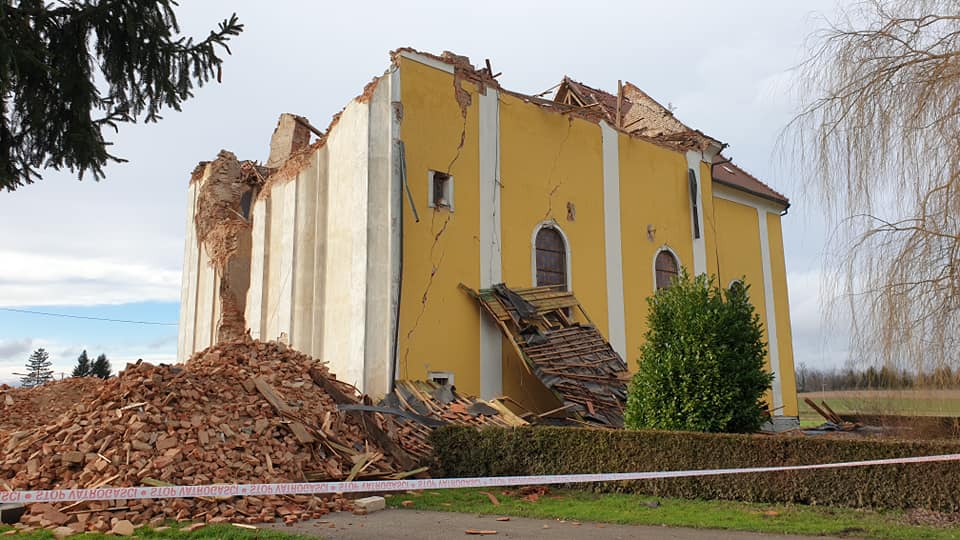
First stop, the church in the village of Zuzana, which was where one of the 7 victims of the earthquake perished. The church organist was apparently cleaning the organ when the front half of the church disappeared in seconds.
A year later, all the rubble has gone, and some wooden boards added to the roof.
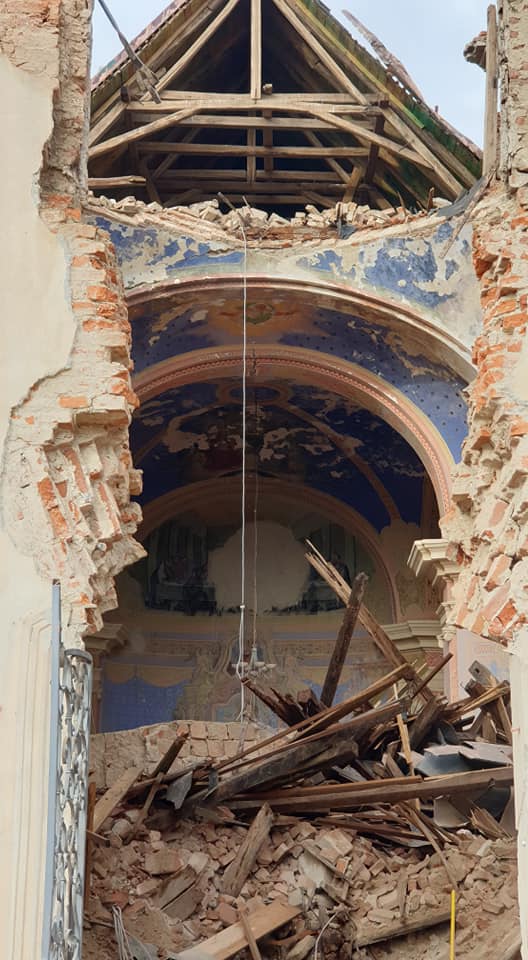
The beautiful interior cum exterior with frescoes in 2020...
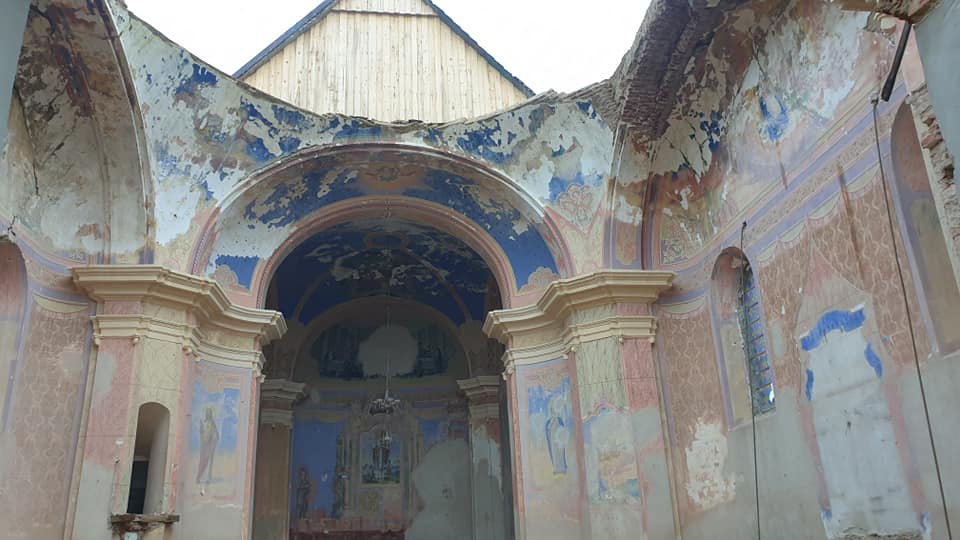
... and in 2021.
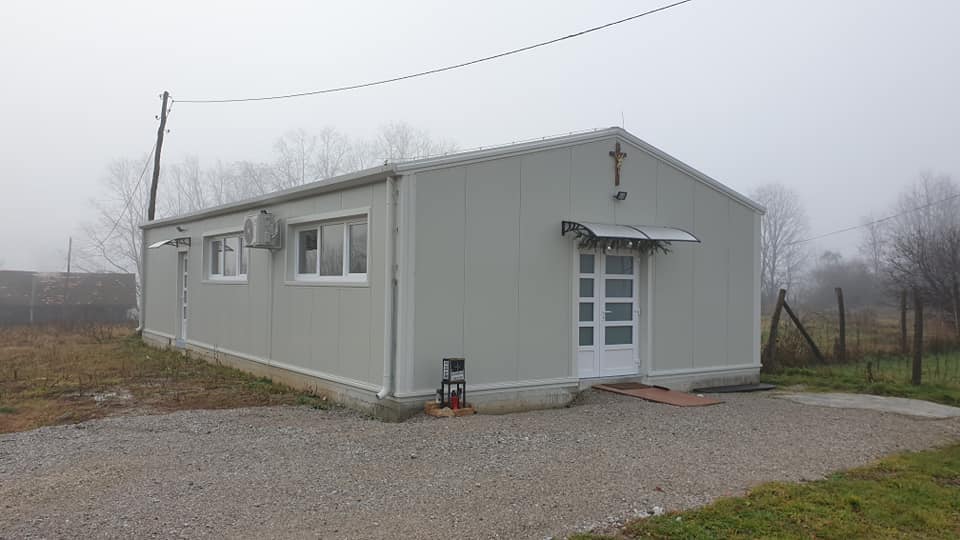
Although not much work has been done on the old church, there has been construction almost directly opposite - the new church, consisting of a few containers put together. I almost wrote 'temporary church' but I wonder if it will be temporary.
Those wanting to make a donation to the church restoration fund are welcome to do so.
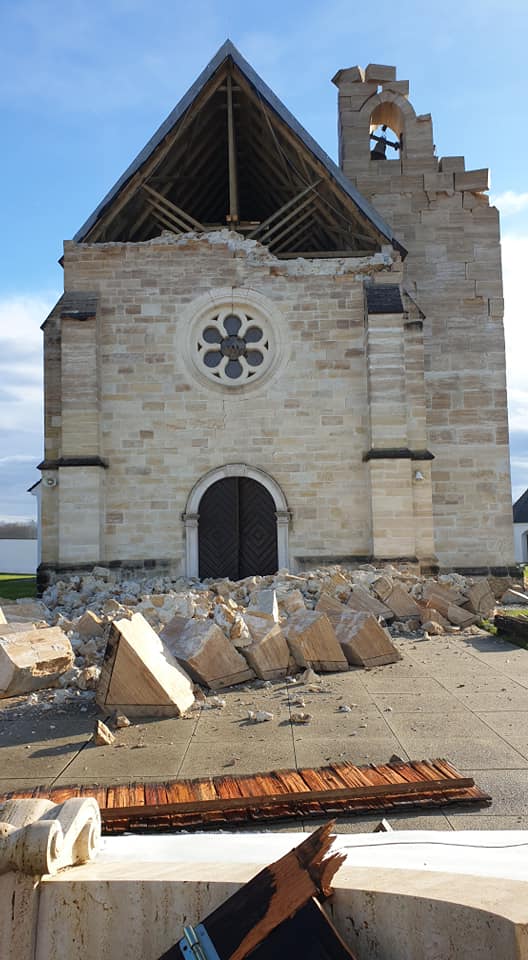
We revisited another church on the way to Majske Poljane, the epicentre of the earthquake. This beautiful stone church had been rebuilt after being destroyed during the Homeland War and had only been in function a few years. By contrast, there were wooden houses nearby which were totally unaffected by the quakes.
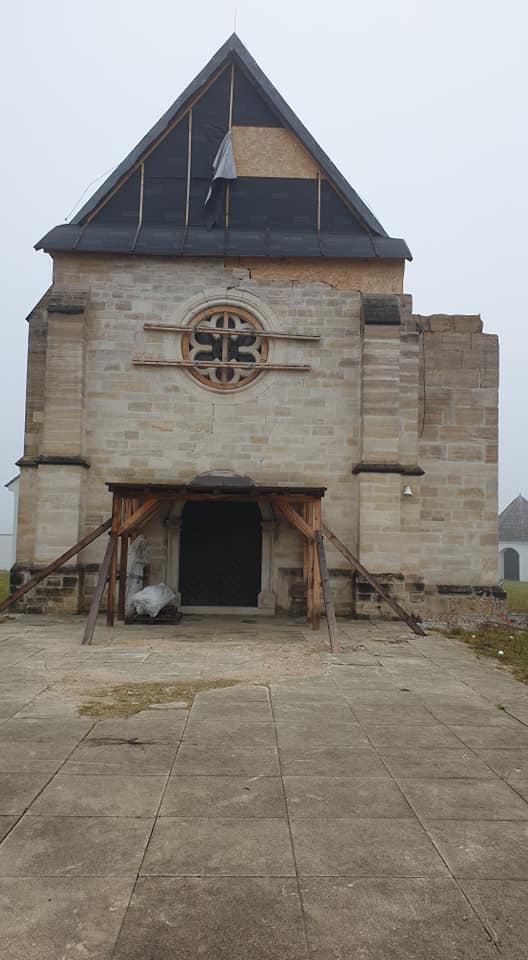
A year later.
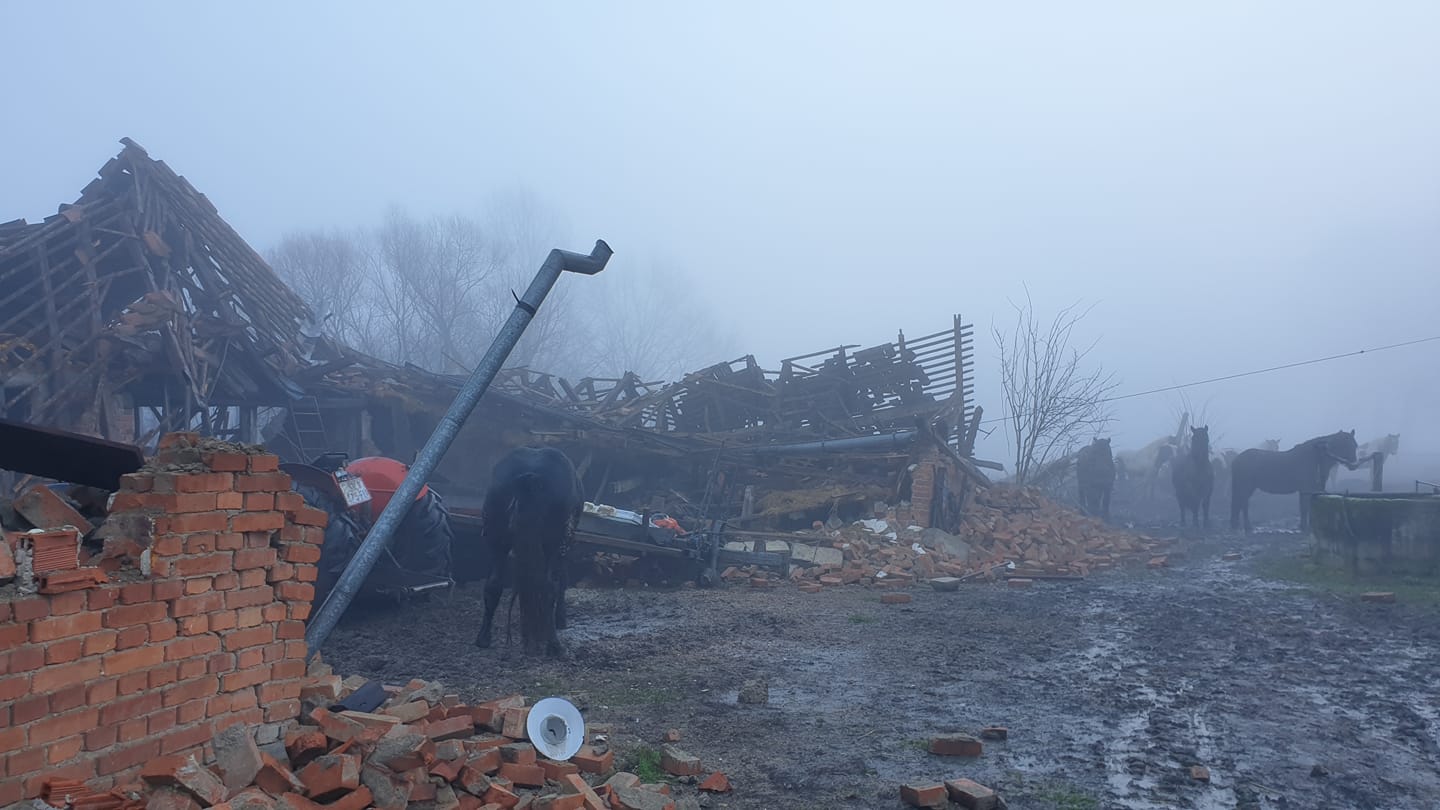
By far the most depressing place last year was the forgotten village of Majske Poljane. I found these horses looking a little bewildered at the end of the village last year. After tipping off a couple of national news crews about their whereabouts, they were television stars that night, with donations of hay and other supplies pouring in. The houses all around them had been flattened.
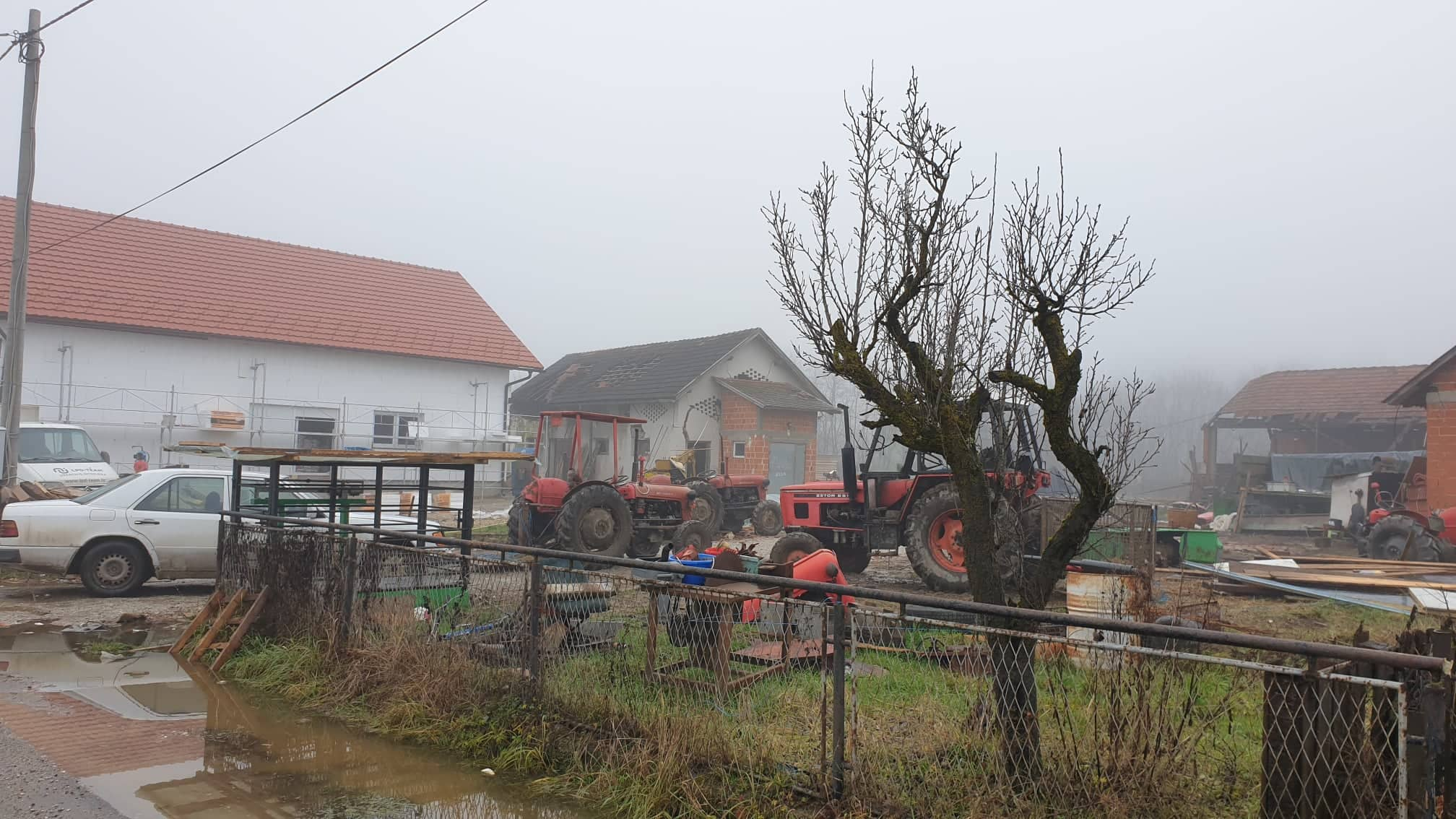
A year later, the horses have found another home, the rubble has been cleared, and a new house is being constructed.
Cows in the field behind are almost the only sign of life in the village, which has no shop, bakery, cafe or bus service. For those without a car, walking or cycling about 7km to Glina is the only option. There are very few people left in Majske Poljane.
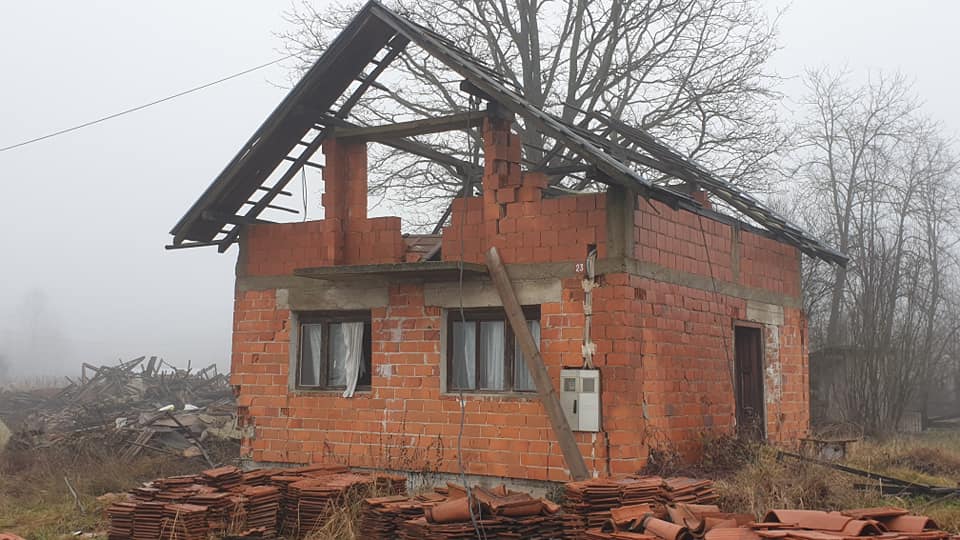
And while there were a few renovated houses, as well as a sprinkling of donated containers, mostly it looks a lot like this.
How much of the damage is due to the 2020 earthquake, and how much from the war in 1991-5? It is not always so easy to distinguish. And with many buildings abandoned 30 years ago, one wonders what the chances are for revitalising communities such as Majske Poljane this time around.
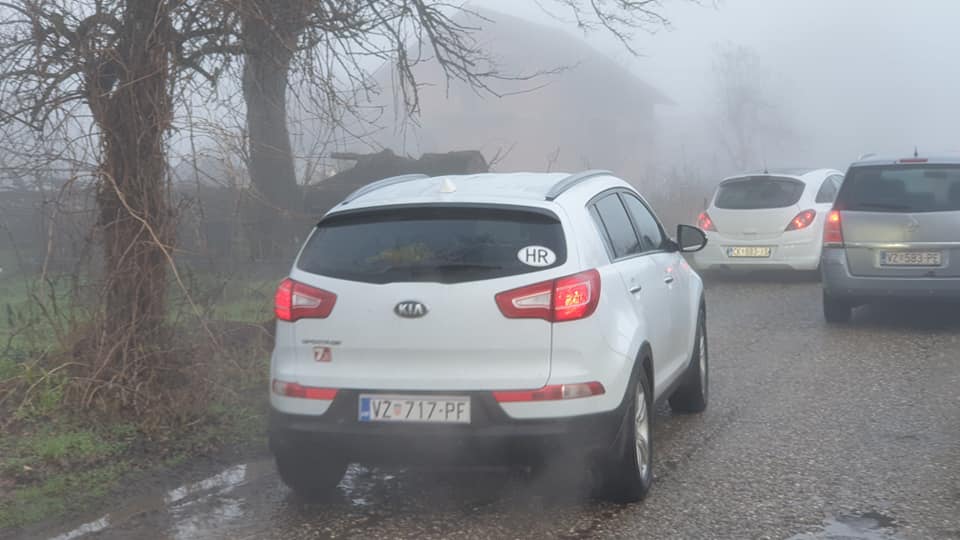
Last year, the narrow street that runs through this very long village was packed. They came from Dubrovnik, Slavonia, Istria, and Varazdin. Private citizens who filled their cars with food, blankets and medicine, and they headed to Petrinja, Sisak and surrounding villages to offer what help they could. It was a heartwarming sight and one more confirmation that Croats really are the best nation in the world in adversity.
There were hardly any cars this year, just a couple of journalists and a few policemen.
We soon found out why, as I was ordered to move my car, for the Croatian President was coming to visit the village on the anniversary. It was quite the entourage, probably more cars than the village has seen the entire month.
Being the star photographer that I am, my phone was set to video as President Milanovic went to visit a family to use as a political tool in his fight with Prime Minister Plenkovic.
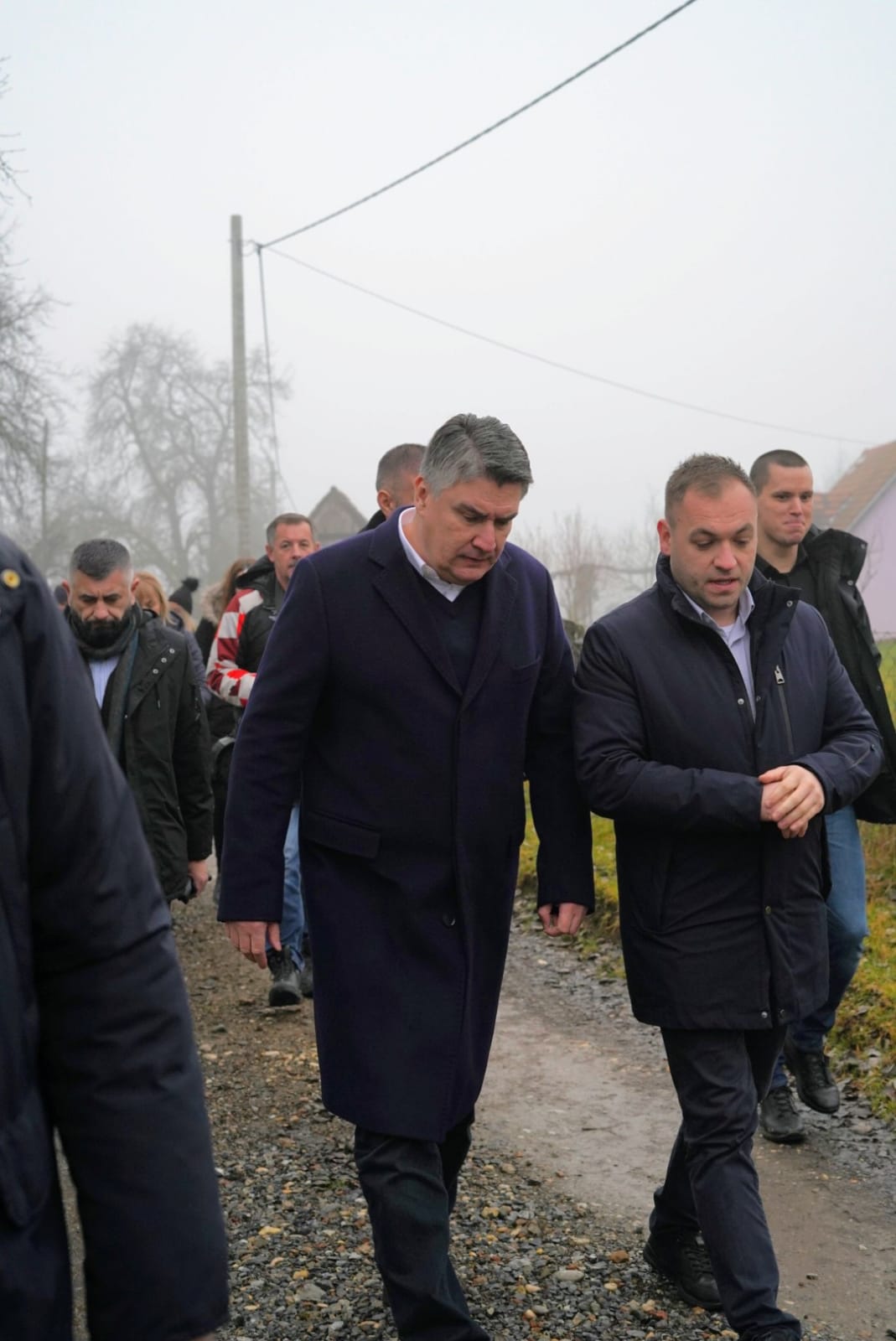
Fortunately Steve is a better photographer than me. The total visit was about 10 minutes. It felt a little like the levels of interest politicians have in Vukovar on November 18. And then forget for 364 days.
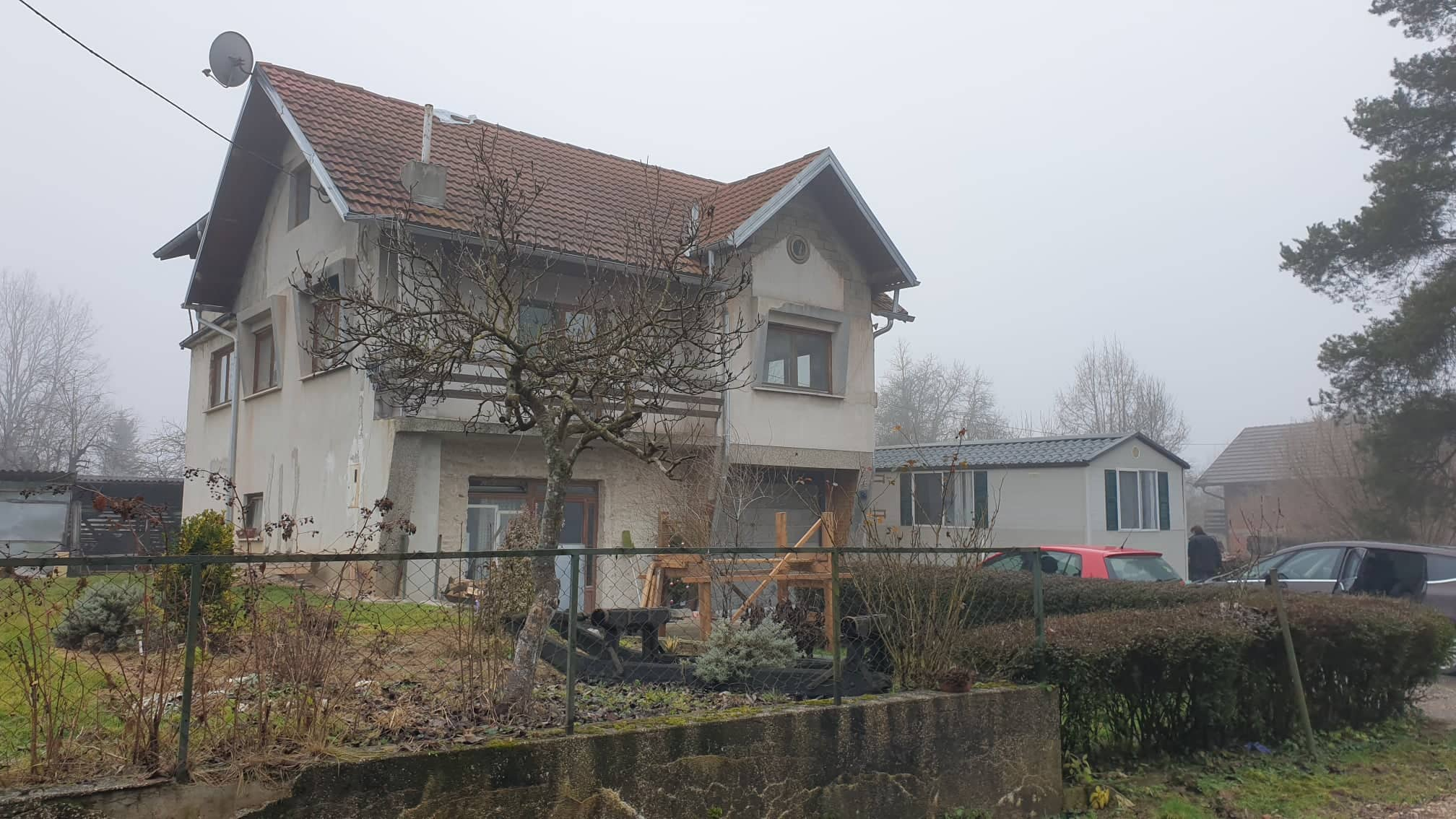
I have never been very good at being a journalist and had no idea that the President was coming, but we decided to follow. The narrow road made a mockery out of our attempts to give chase, but eventually we found the parked cars and followed another car into the parking of this house. A surprised and suspicious woman came out - having probably not seen a car pass in a week, she now had 3 parked on her drive. I asked her if it would be ok to park there for 20 minutes, and she gave her assent.
After the media circus had left, I knocked on her door to thank her and to ask her how things were in the village now. Within seconds, she was in tears, talking of the daily struggle and the abandonment (it was clear that a media appearance from the President had little to do with her life). Her only choice for supplies was the 7km bike ride. Everything that they had managed to renovate had come from their own pockets. The container in the drive was home to her invalid brother. It was a miserable existence.
I put my hand in my pocket to give her the money I had, which she accepted after a slight hesitation. She had just baked a cheese pie, and she gave me a few pieces for my journey, and we said goodbye.
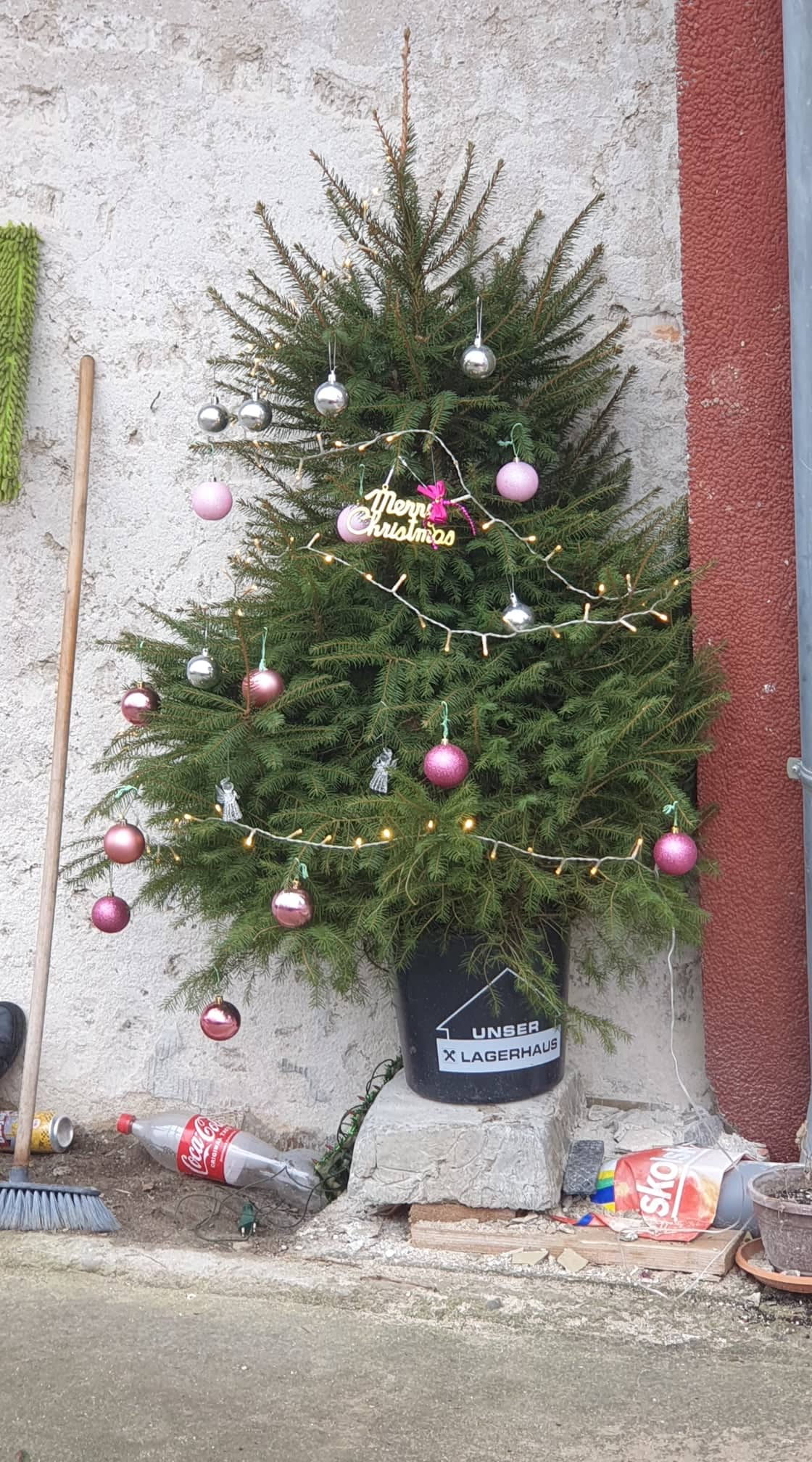
And despite the wretched conditions and surroundings, a celebration of this most festive time of year. But Santa did not come to Majske Poljane in 2021. Or at any time since 1991.
The President (who is from SDP) was not the only one playing politics yesterday. I learned later that Prime Minister Andrej Plenkovic (HDZ) was in Petrinja where he was booed and had a snowball thrown at him. I learned of their movements, and it provides the perfect snapshot of Croatian politics today and how they are failing the lady who made the delicious cheese pie above - and thousands like her. Apparently...
The SDP President visited Majske Poljane and Glina (SDP territory), but not Petrinja (HDZ territory) and denounced the HDZ government response. The SDP Deputy Mayor of Glina criticised the reconstruction for being too slow.
Meanwhile the HDZ Prime Minister visited HDZ Petrinja, but not SDP Majske Poljane or Glina and had some choice words for the President. The HDZ Mayor of Petrinja said that the reconstruction had not started in earnest due to the global financial crisis and problems pre-dating the earthquake.
Same earthquakes.
Same national tragedy.
Same natural disaster which evoked such a united response from the people of Croatia.
As for the politicians...
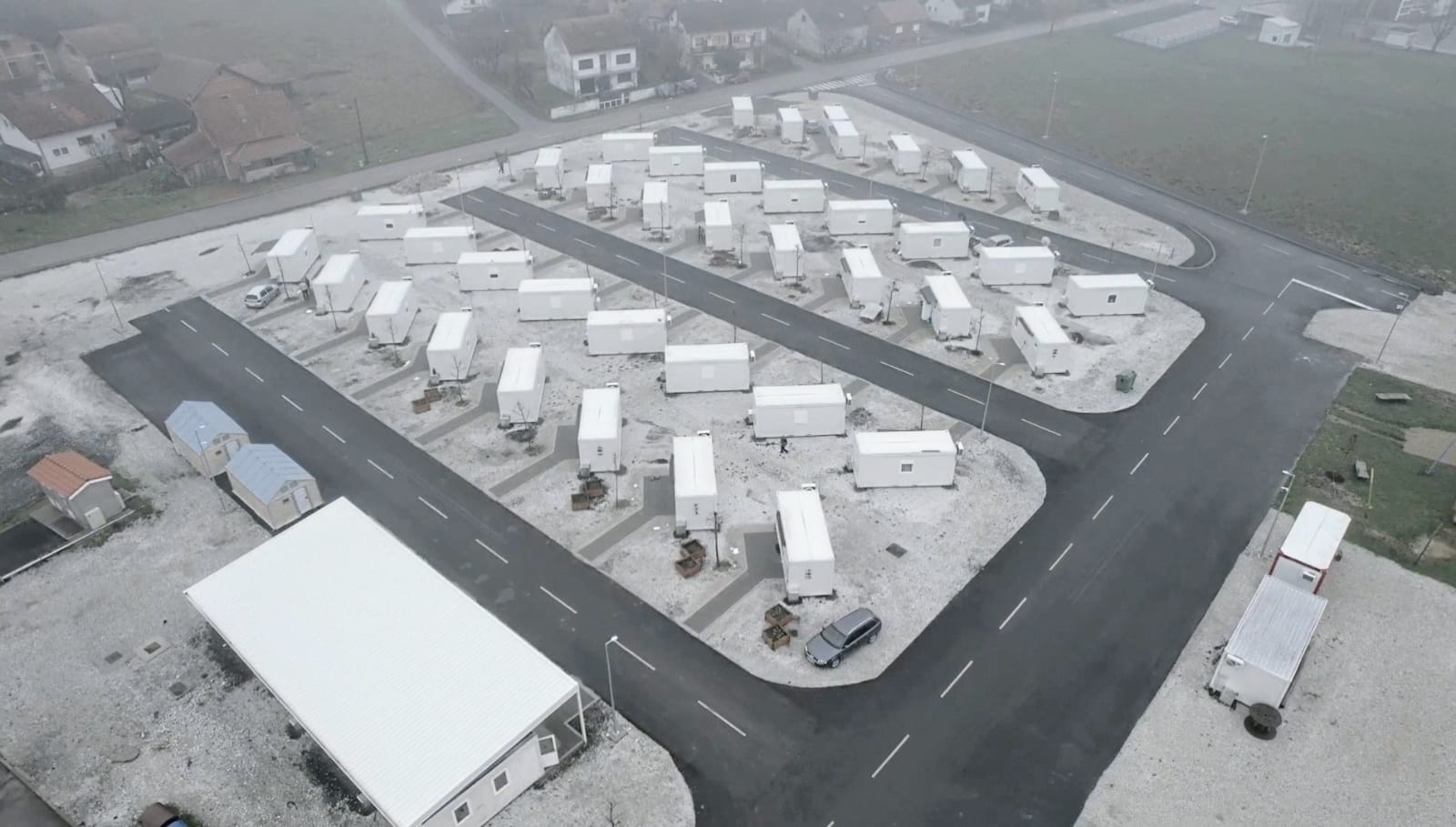
And then the most curious thing. Not far from Majske Poljane, and surrounded by decay and destruction, something akin to a model container village, complete with its own roads and communal facilities such as laundrette.
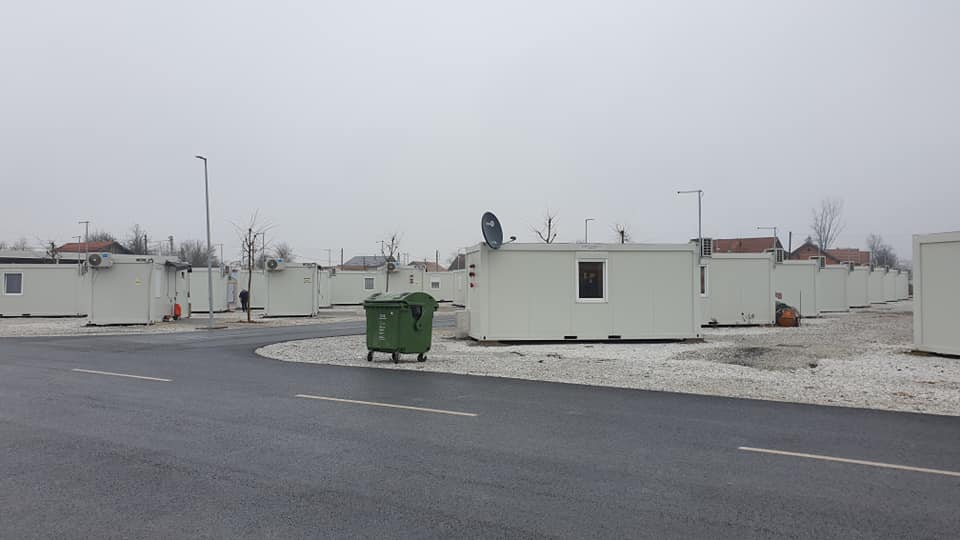
There were about 40 in all, a stark contrast to the decay all around.
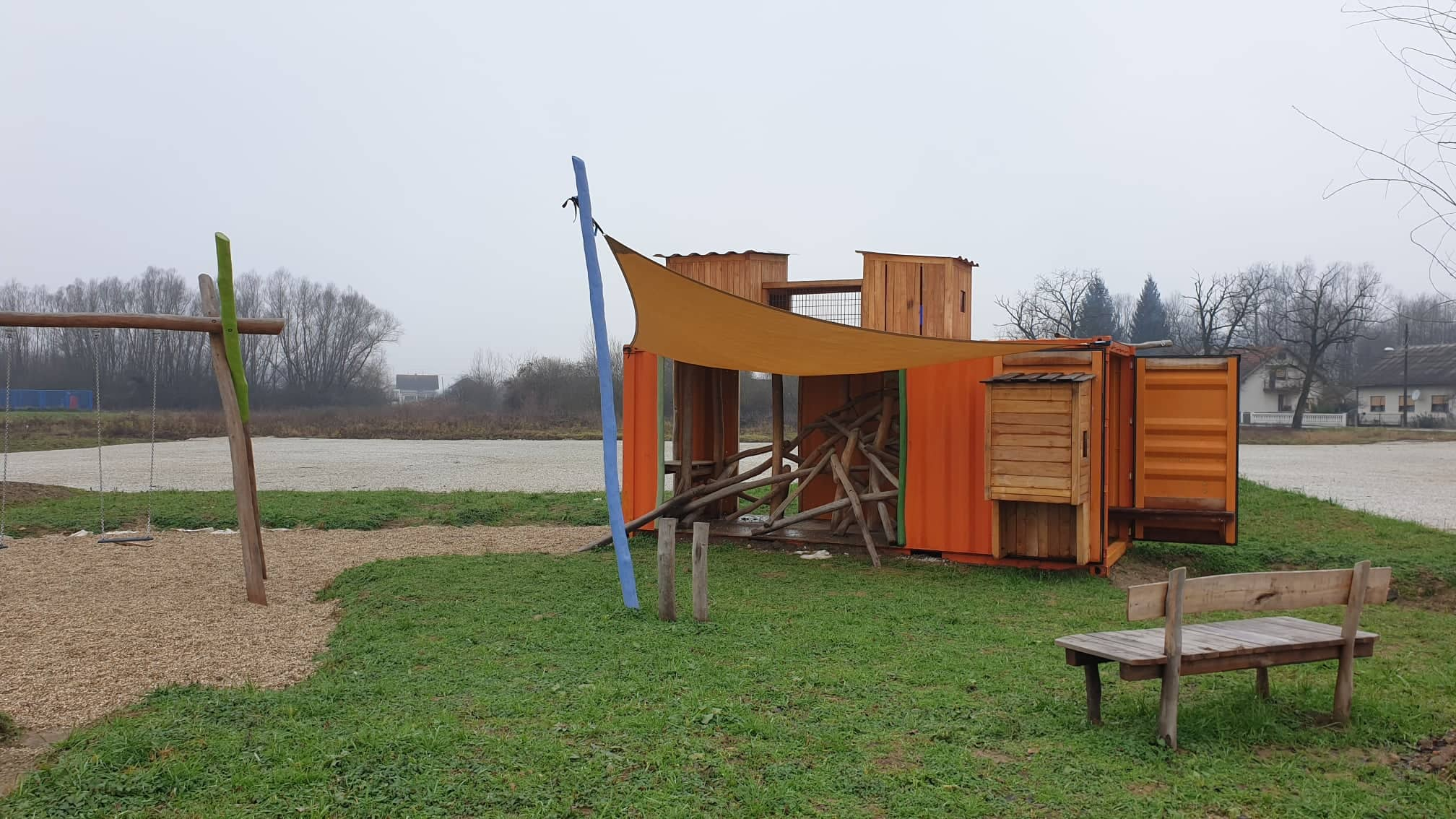
Even a small children's playground.
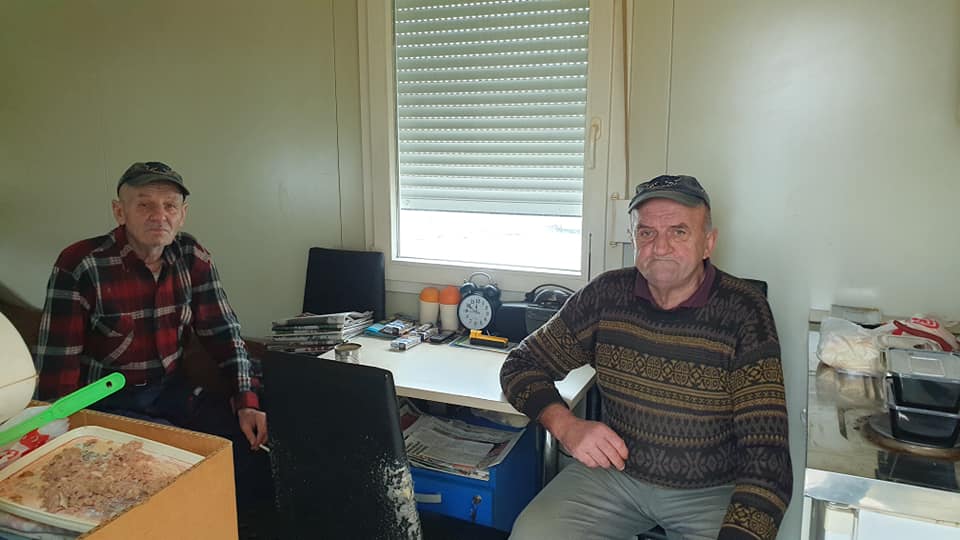
I approached a man smoking outside one of the containers, introduced myself and asked if he wanted to talk. He did.
This has been his home since April 3. He shares the 10m2 container with his brother. It is warm, they bring lunch every day, there is a television.
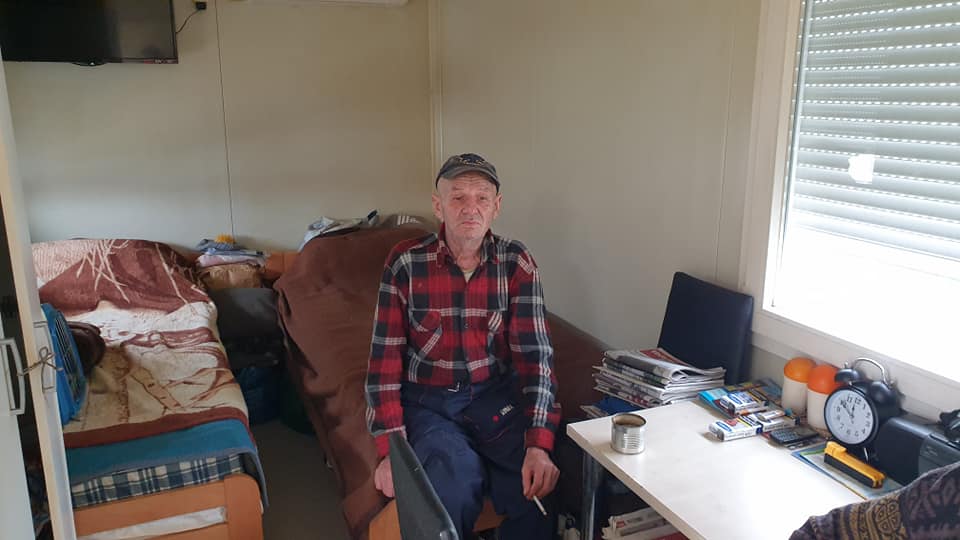
And two single beds, a table, a fridge, a kitchenette, and a bathroom.
It is an existence, and certainly warmer and more comfortable than many around. How long will they stay? He has no idea. There is nothing happening with renovating his house, and there seems to be no plan.
It is an existence.

(Gyumri, Armenia in 1988 - 4.0 International (CC BY 4.0))
My mind went back to 1993 and my days as a humanitarian aid worker in Armenia. I was visiting the internally displaced living in containers after the devastating earthquake in Spitak and Gyumri, which killed at least 25,000 people 5 years earlier.
Gorbachev had promised to rebuild everything, but he and his Soviet Union were soon confined to history, and those poor souls were still living an existence in the same containers 5 years later. I was there to do a food security survey for a new round of food distribution.
"Fuck off back to where you came from. We are sick of your surveys. Sick of just existing. Do something so we can move out of this shit."
I felt their pain then, and I felt it yesterday and sincerely wish the same thing does not happen in Croatia.
But I am sadly not hopeful.
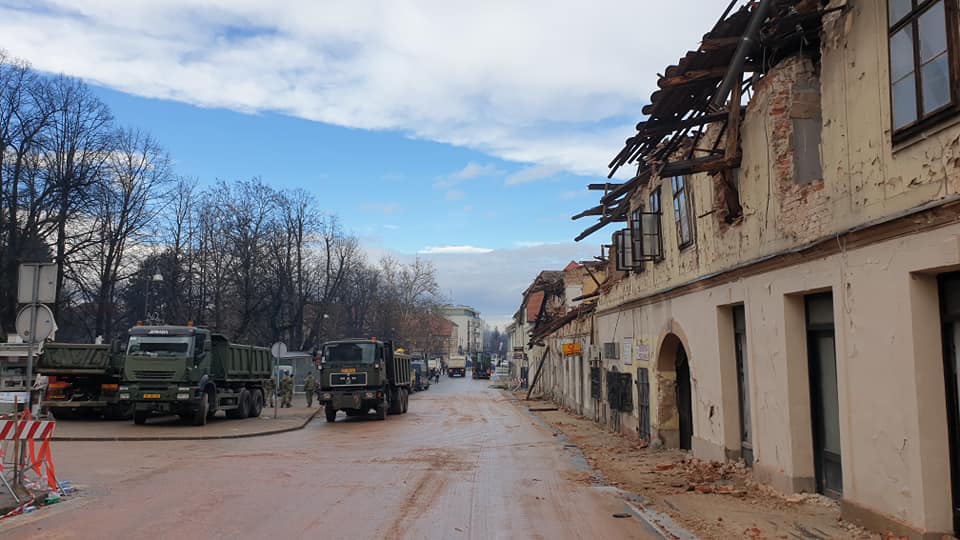
It was a solemn drive to Petrinja, which was VERY busy and lots of police. We found out later that the Prime Minister was there, attending a memorial mass.
This is how the main square looked a year ago.
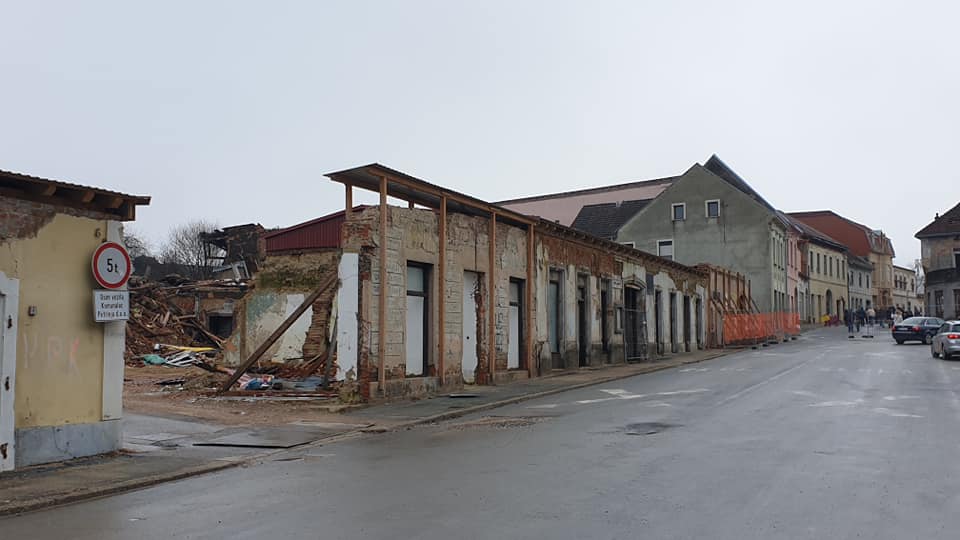
And yesterday. Everything has been stripped back, as though a proper and thorough renovation and restoration process is about to take place. I sincerely hope so, although it felt somewhat ironic seeing so many facades standing alone with no building behind them anymore. As if that might be the fate of the town. But let's hope.
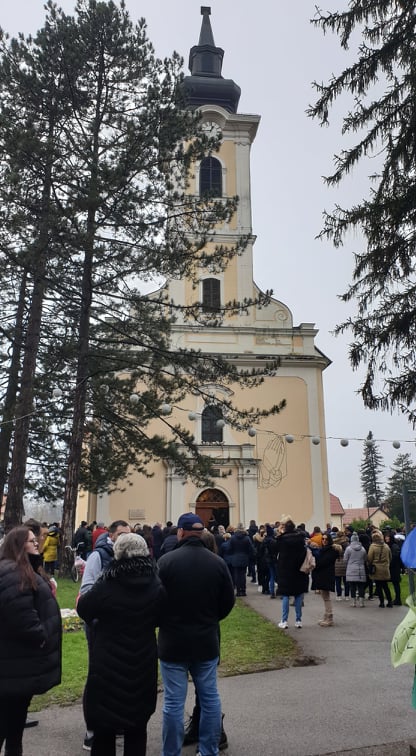
A good attendance at the Mass.
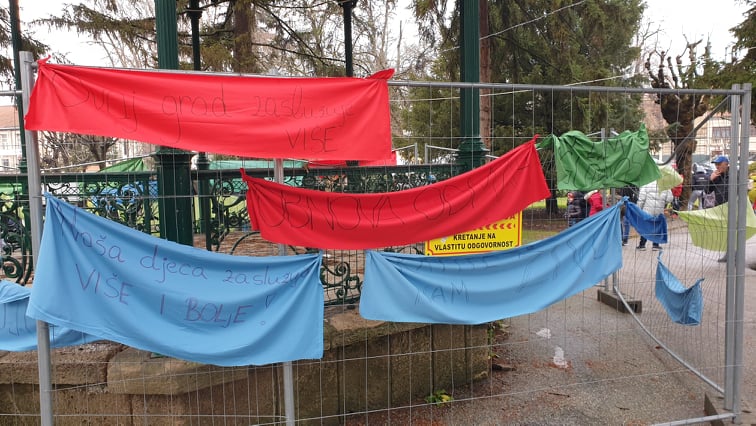
It was only when I got closer that I wondered how many were attending the Mass, and how many protesting against the Prime Minister. The messages were fairly direct:
This town deserves better
Our children deserve more and better.
Reconstruction immediately.
The people of Petrinja certainly got their message across. Whether or not it will lead to affirmative action remains to be seen.
With the benefit of Steve's drone, there was one additional stop this year, to the small village of Mecencani, about 20km south-east of Petrinja. It has become the sinkhole capital of Croatia, with more than 100 holes suddenly appearing in the ground after the earthquake.
A distressing day, and one which was perhaps summed up by this image as we exited Majske Poljane. A lone man, mixing concrete, working alone to do the step-by-step reconstruction of (presumably) his home.
TCN will return in a year to see what progress has been made.


